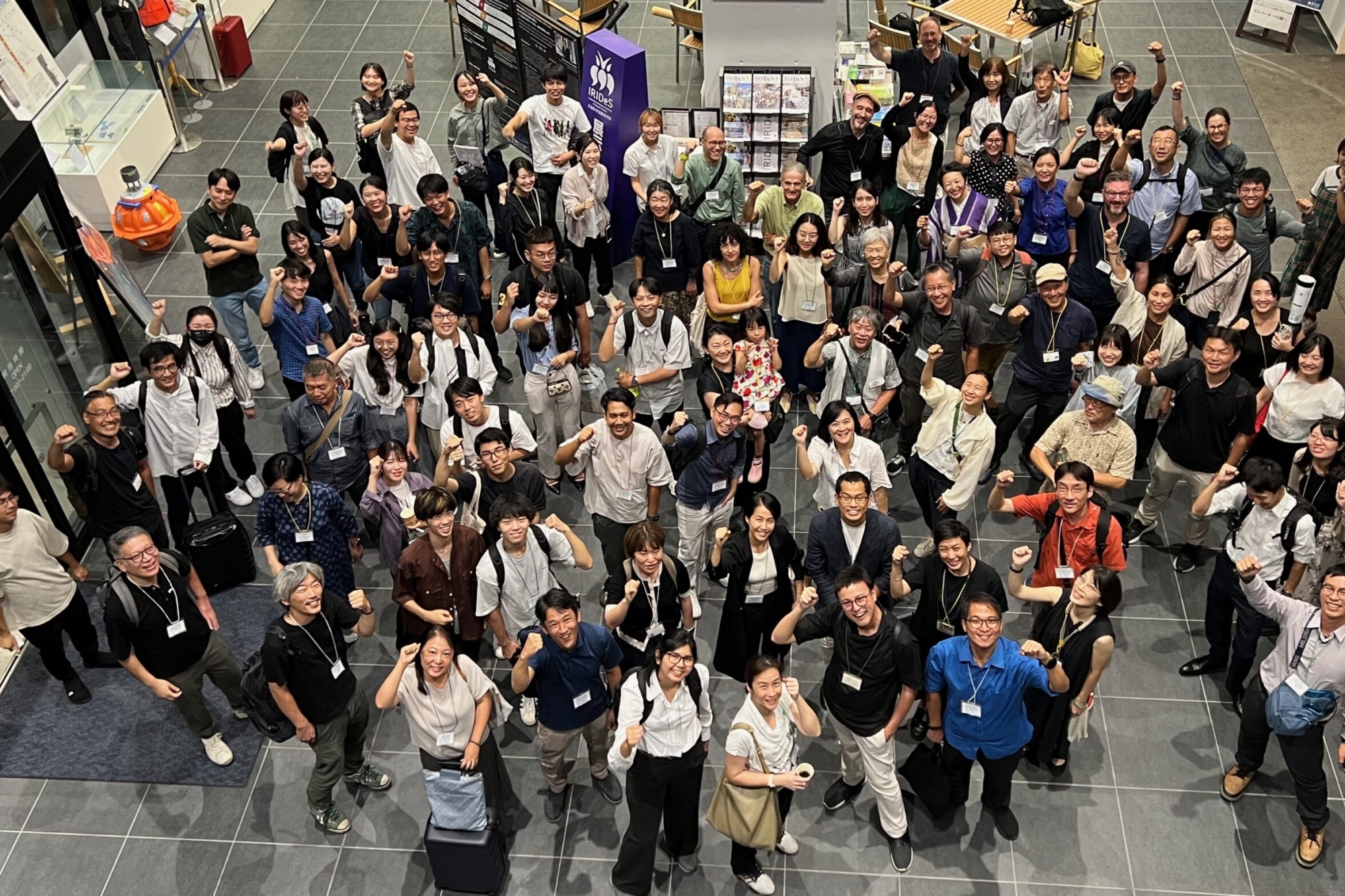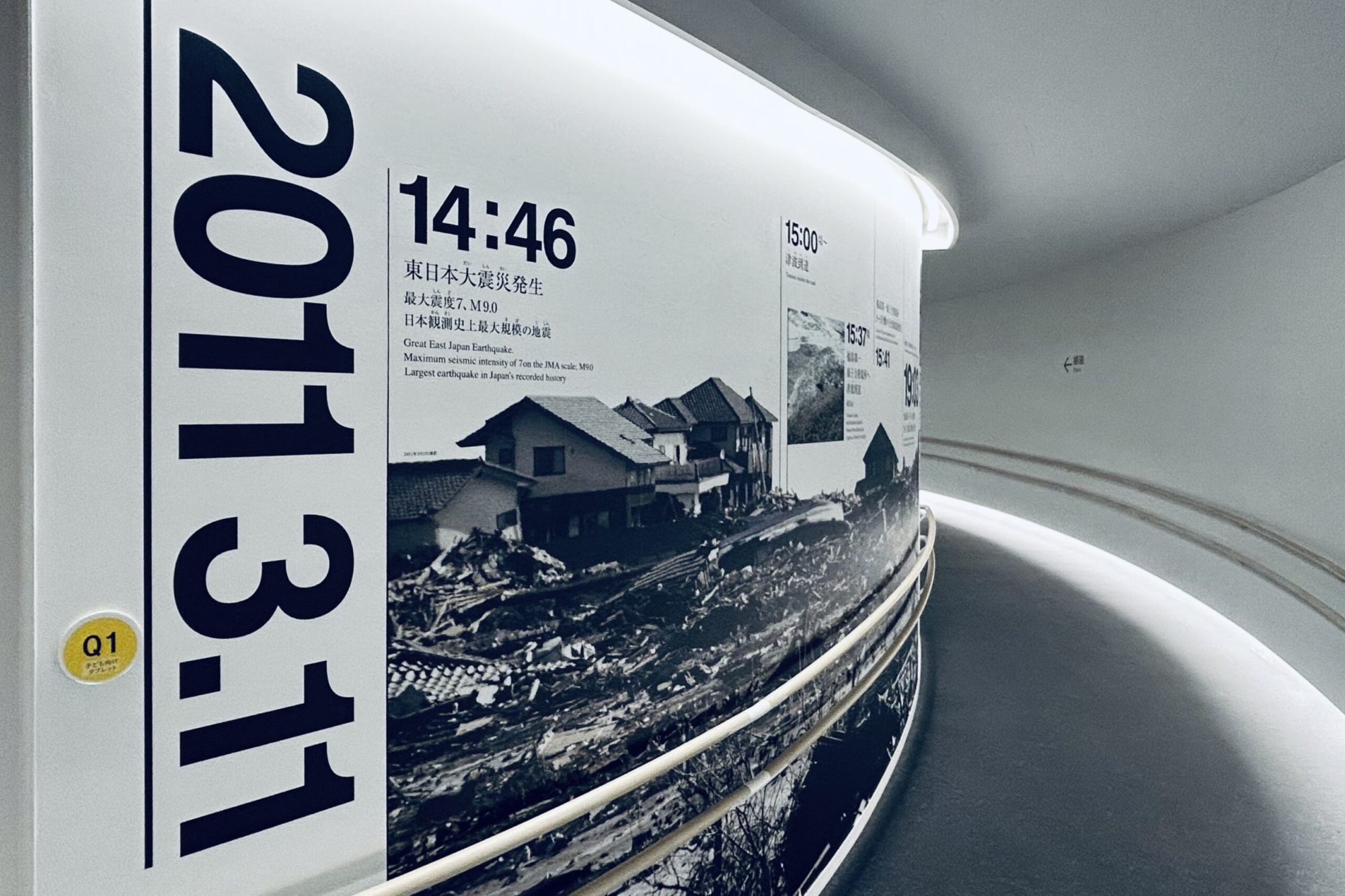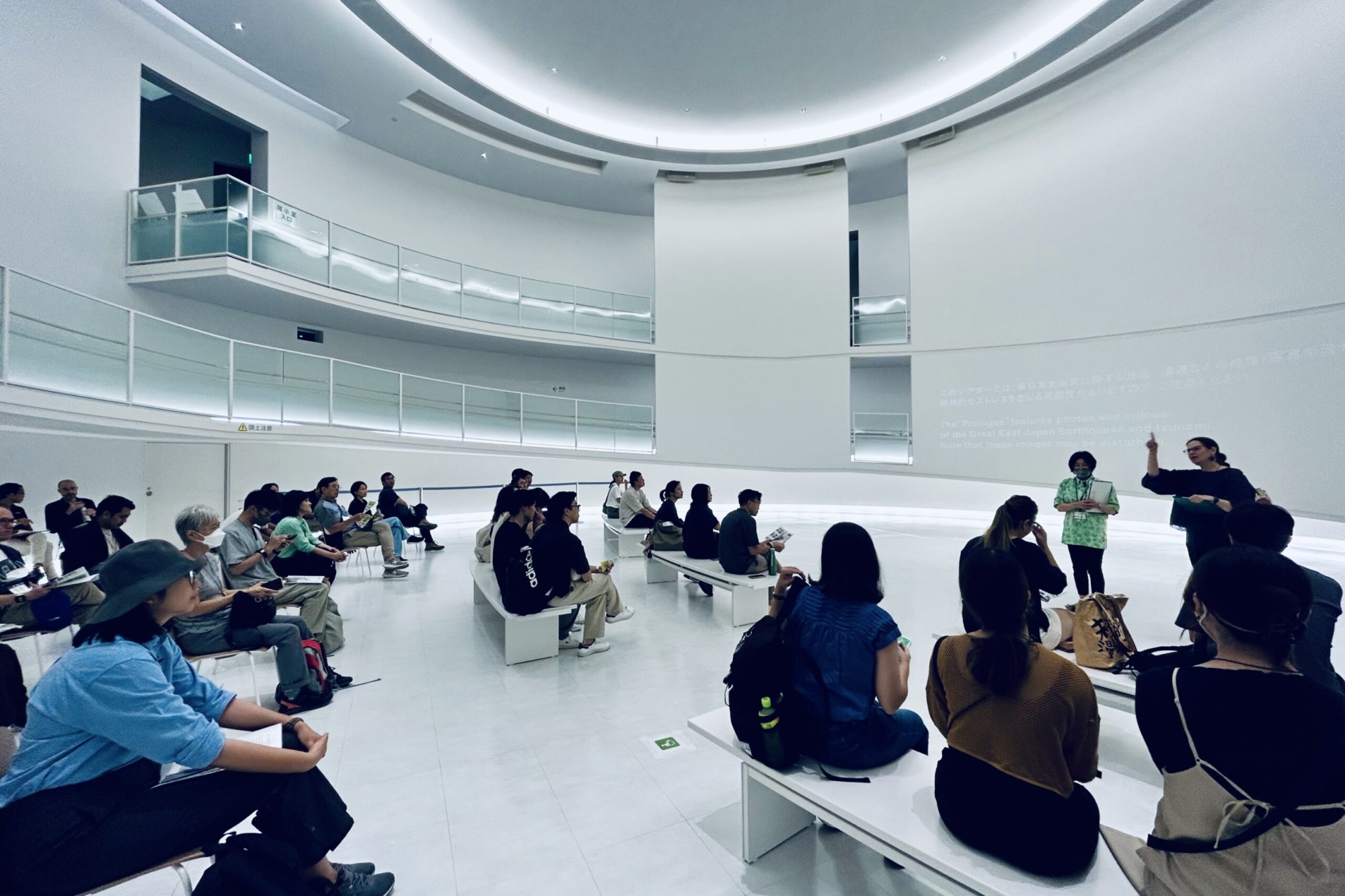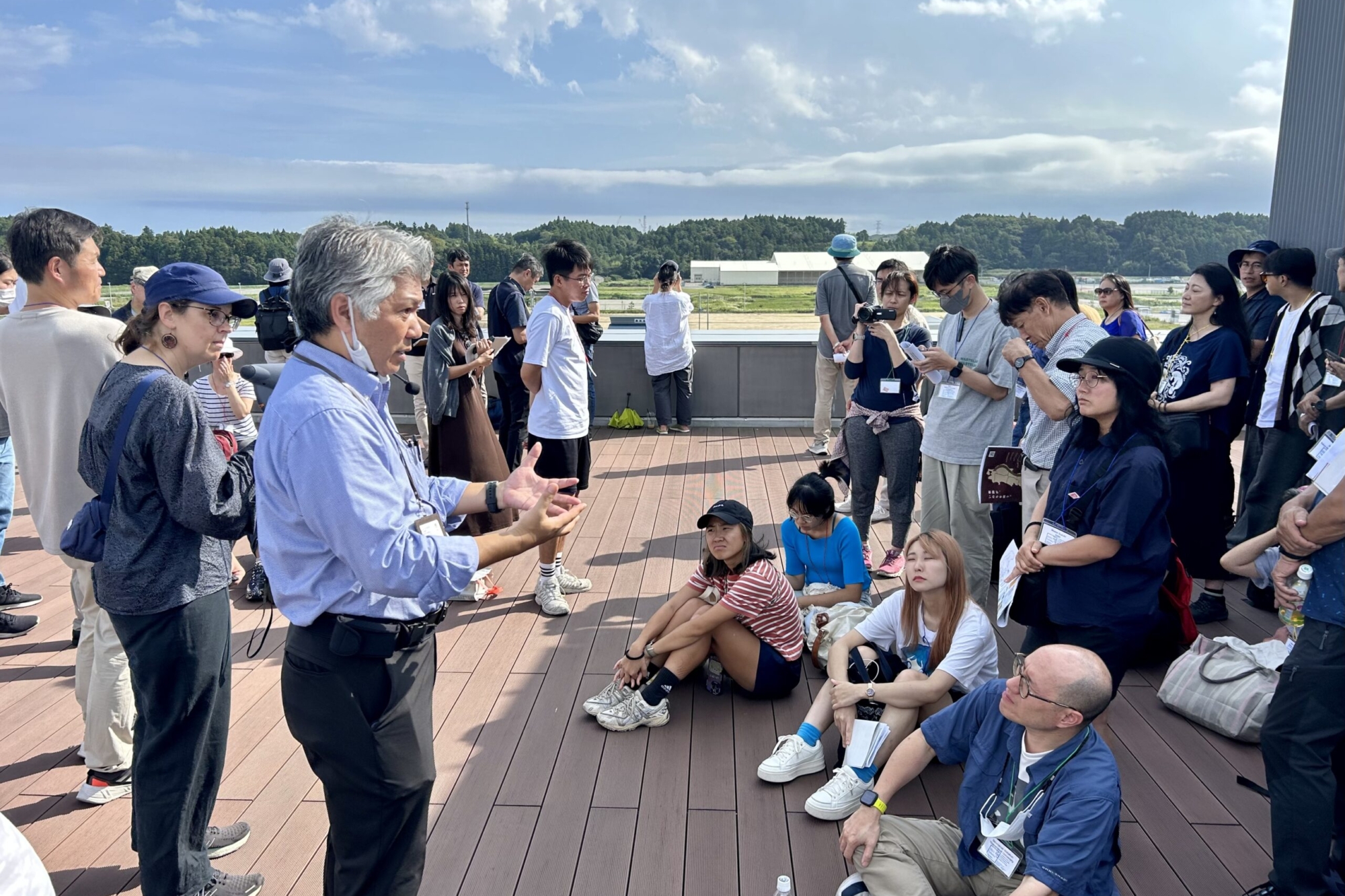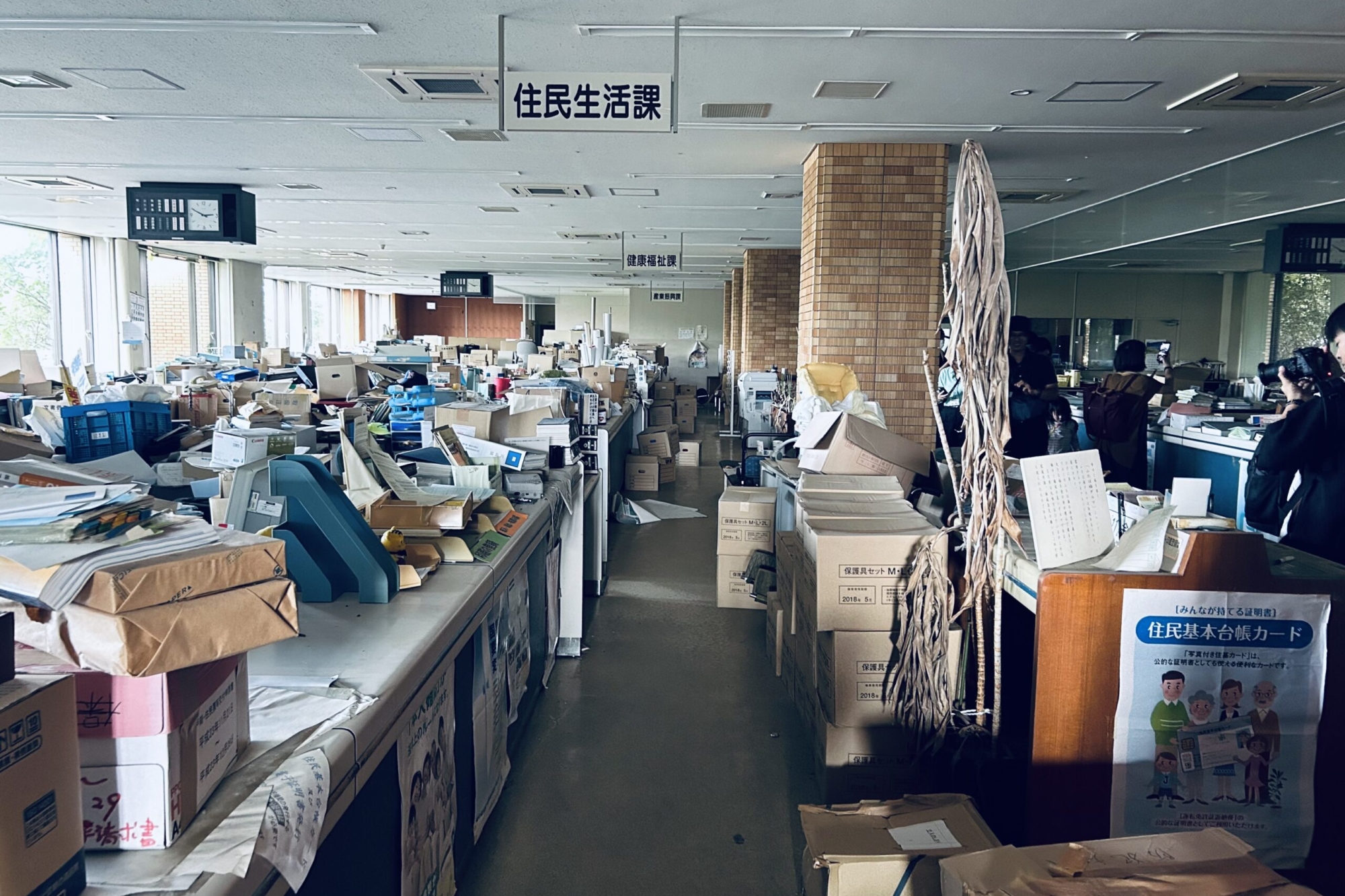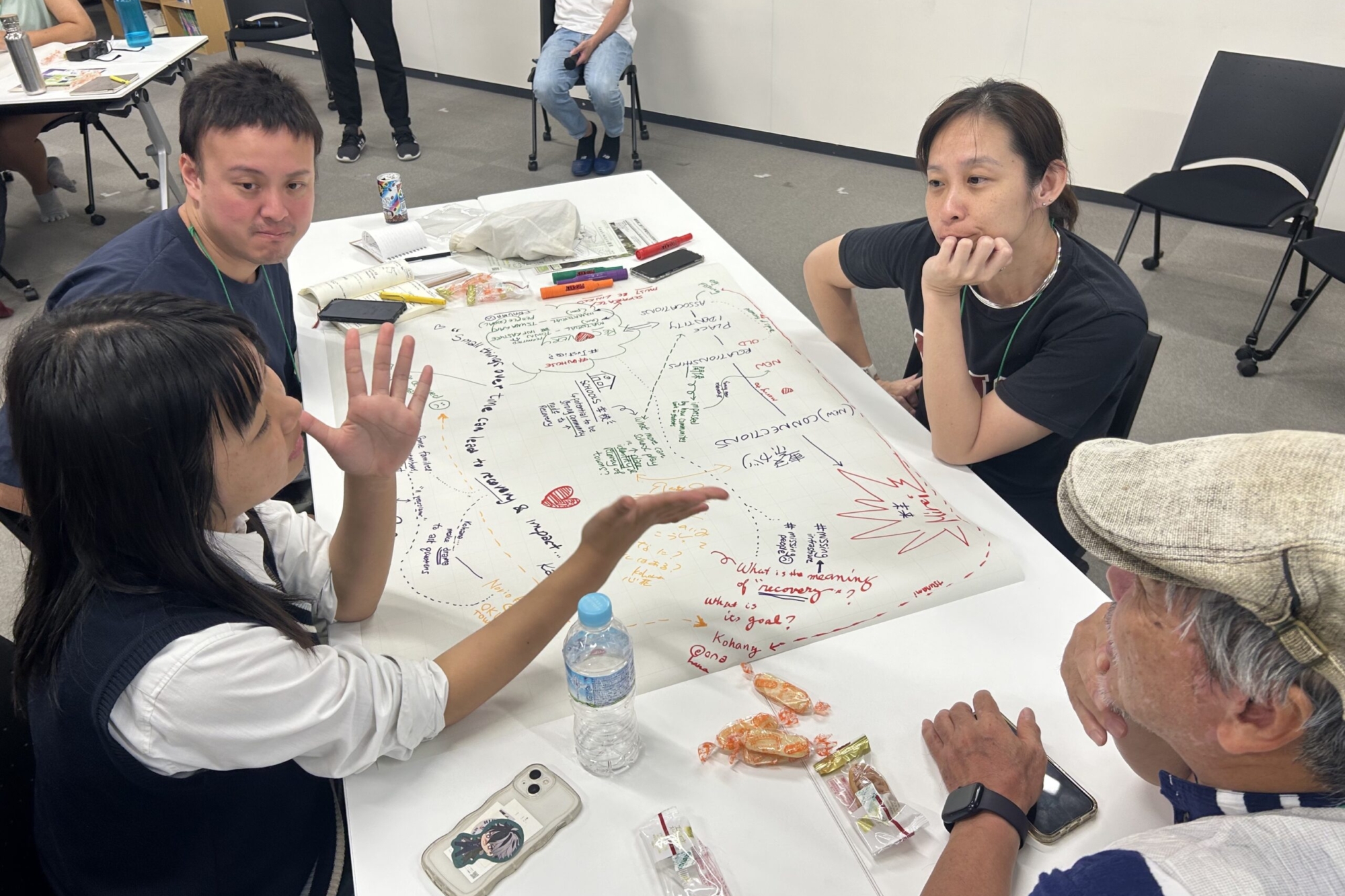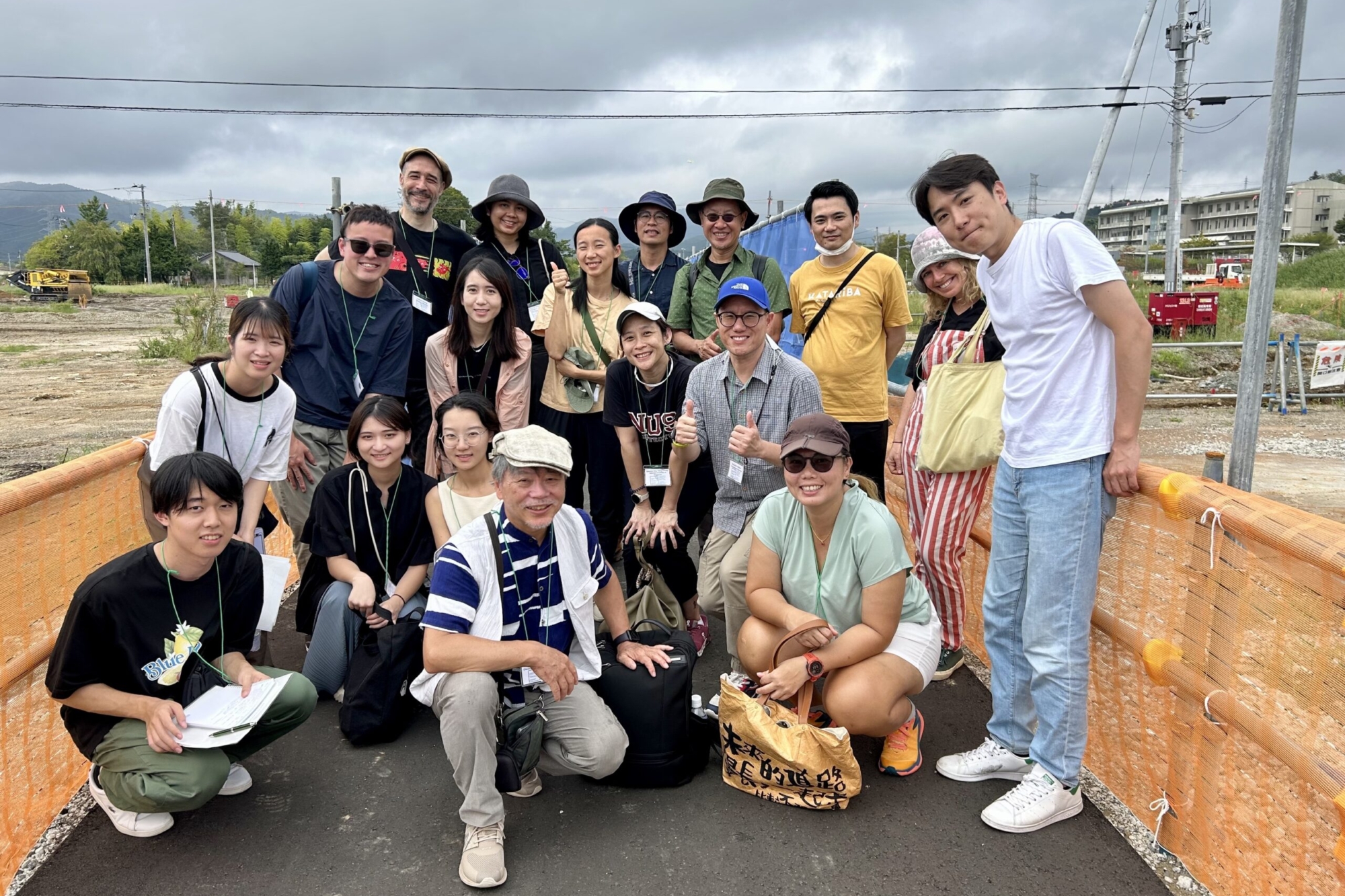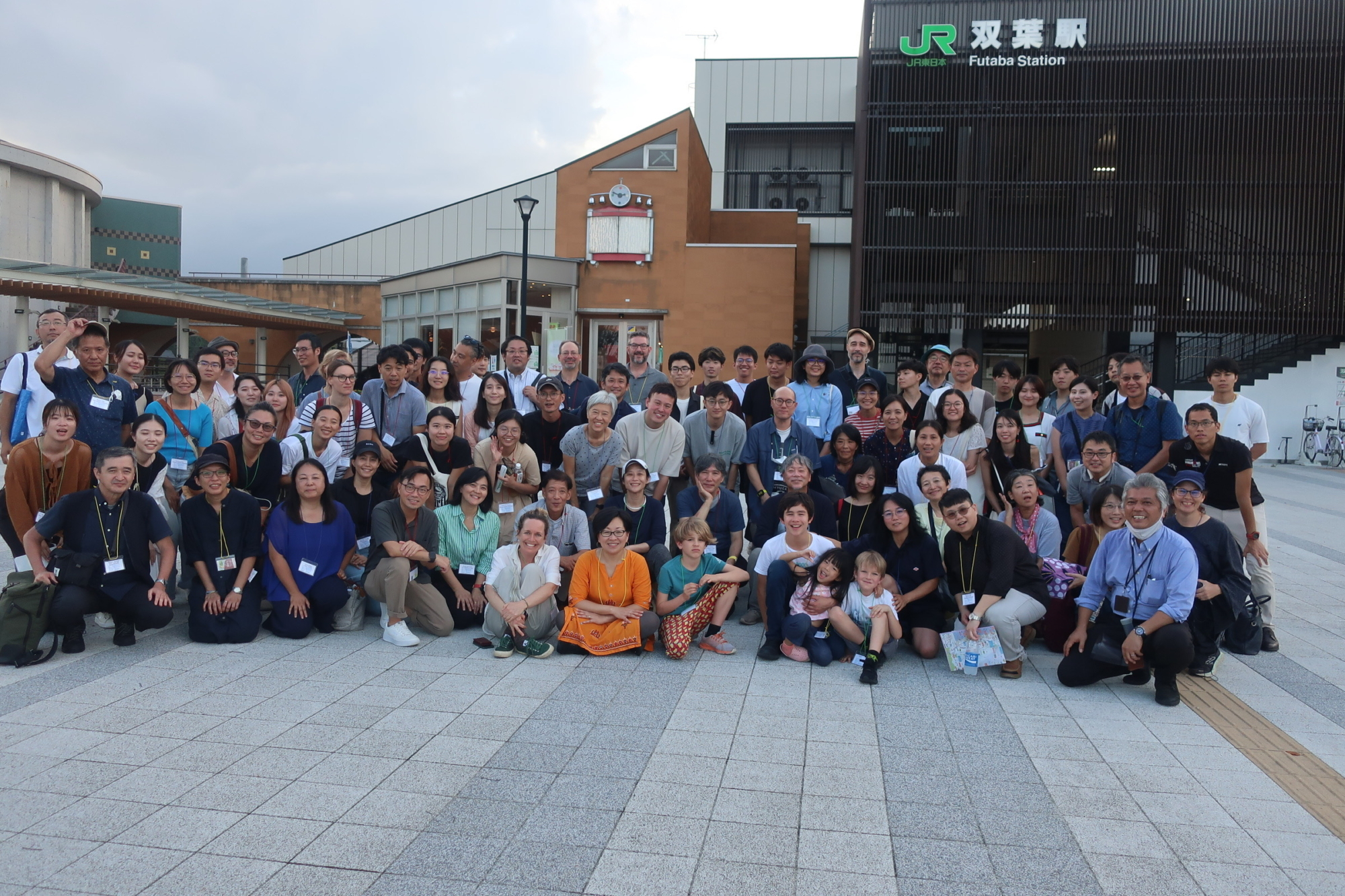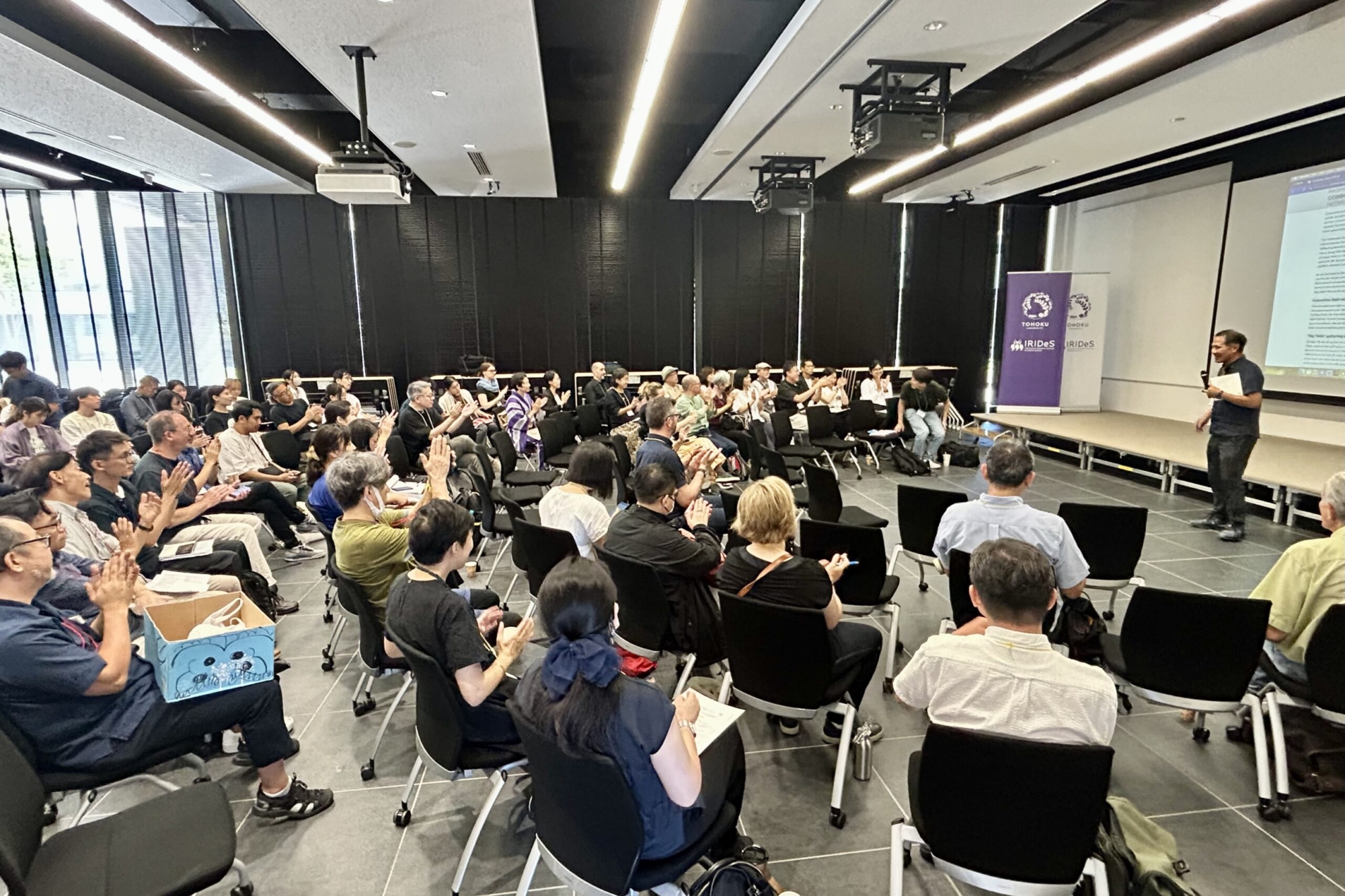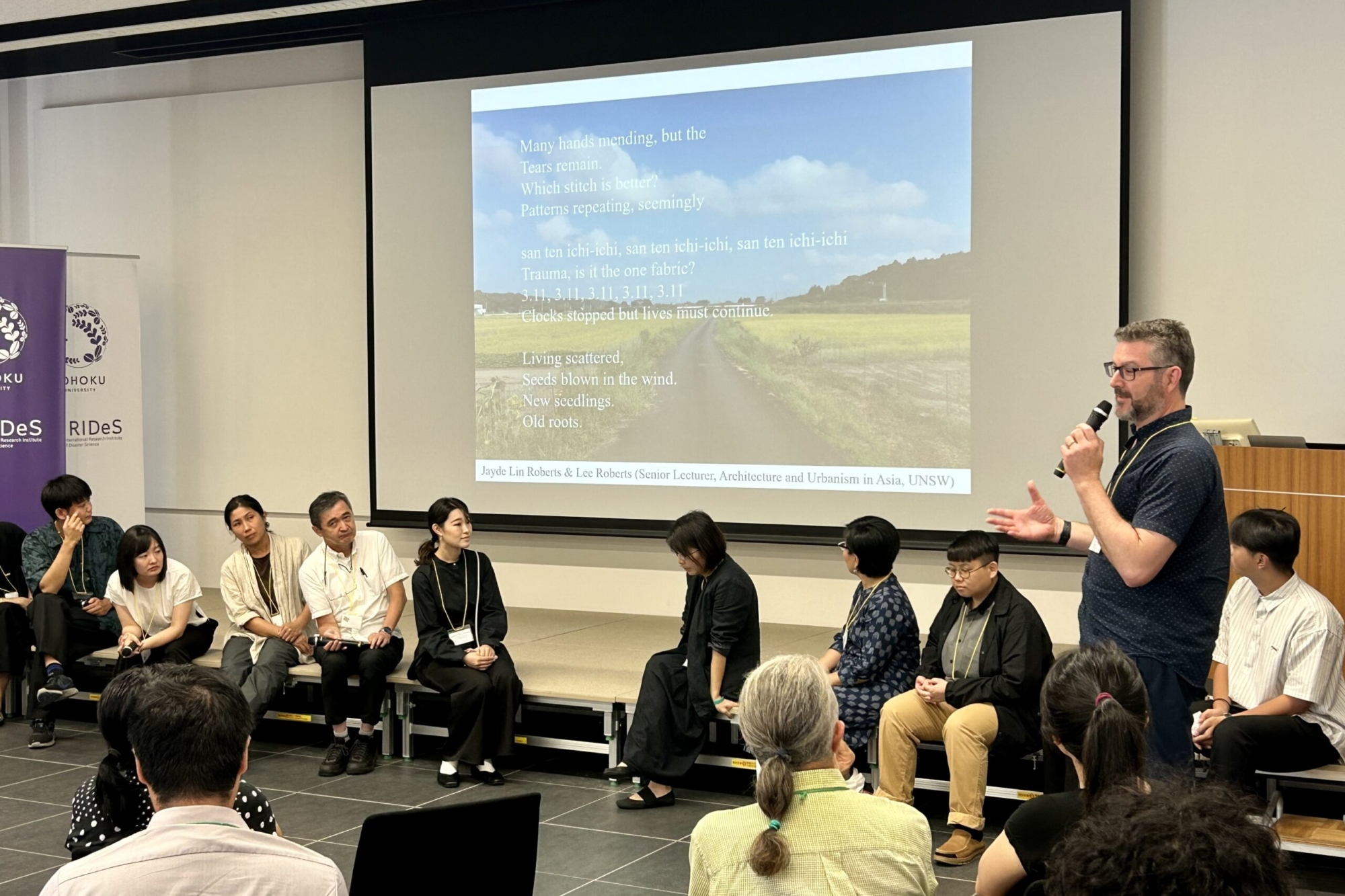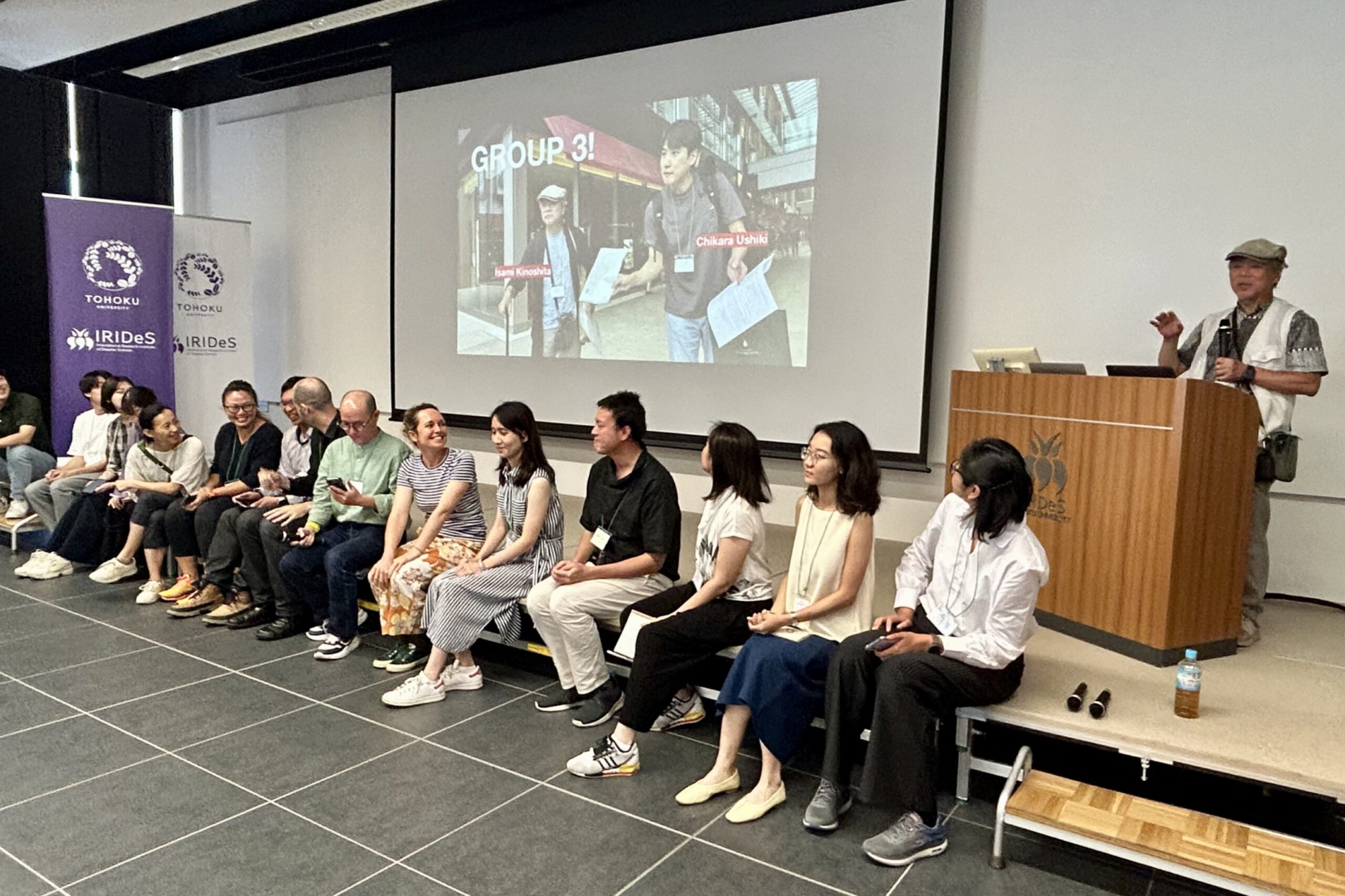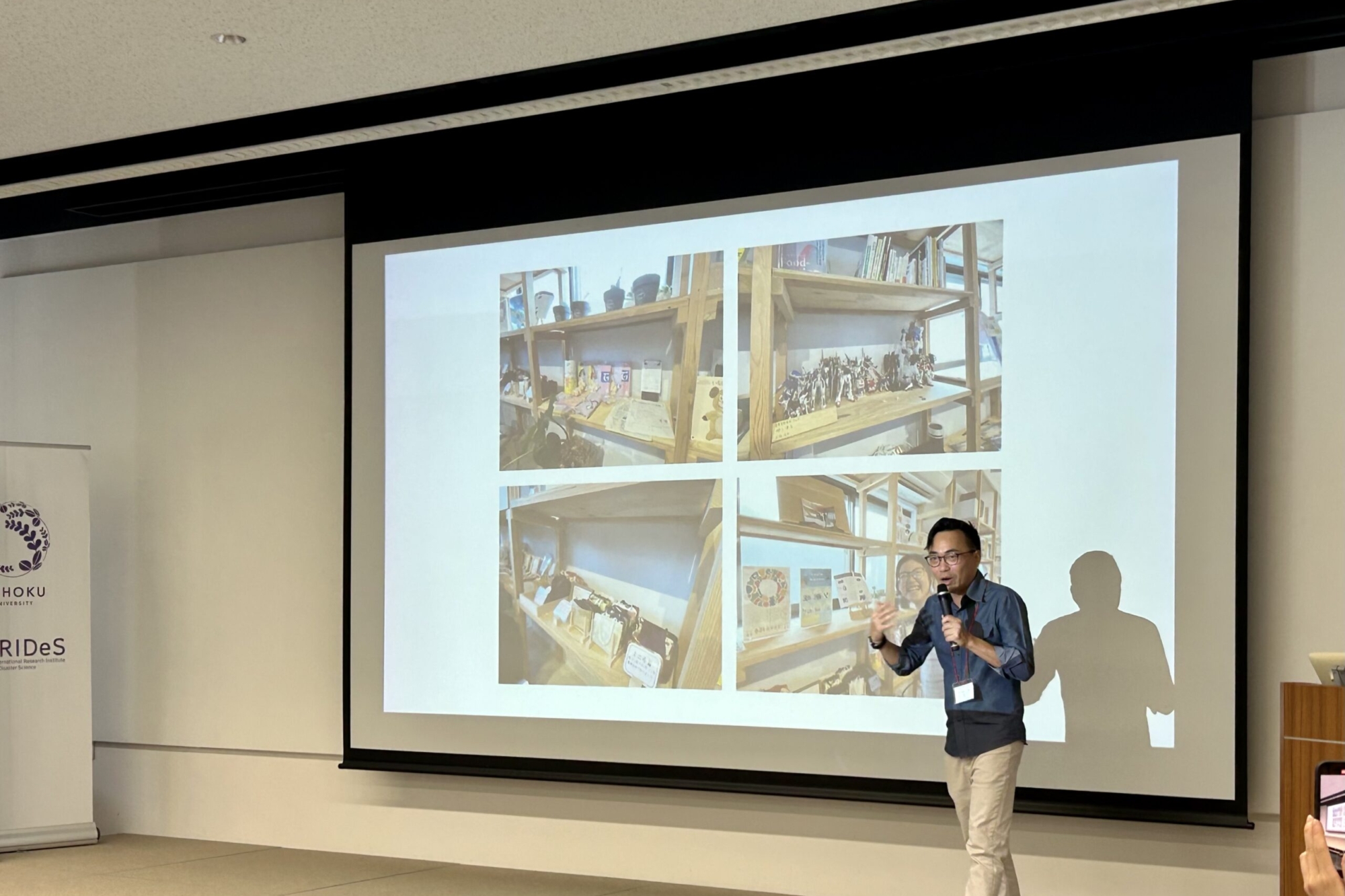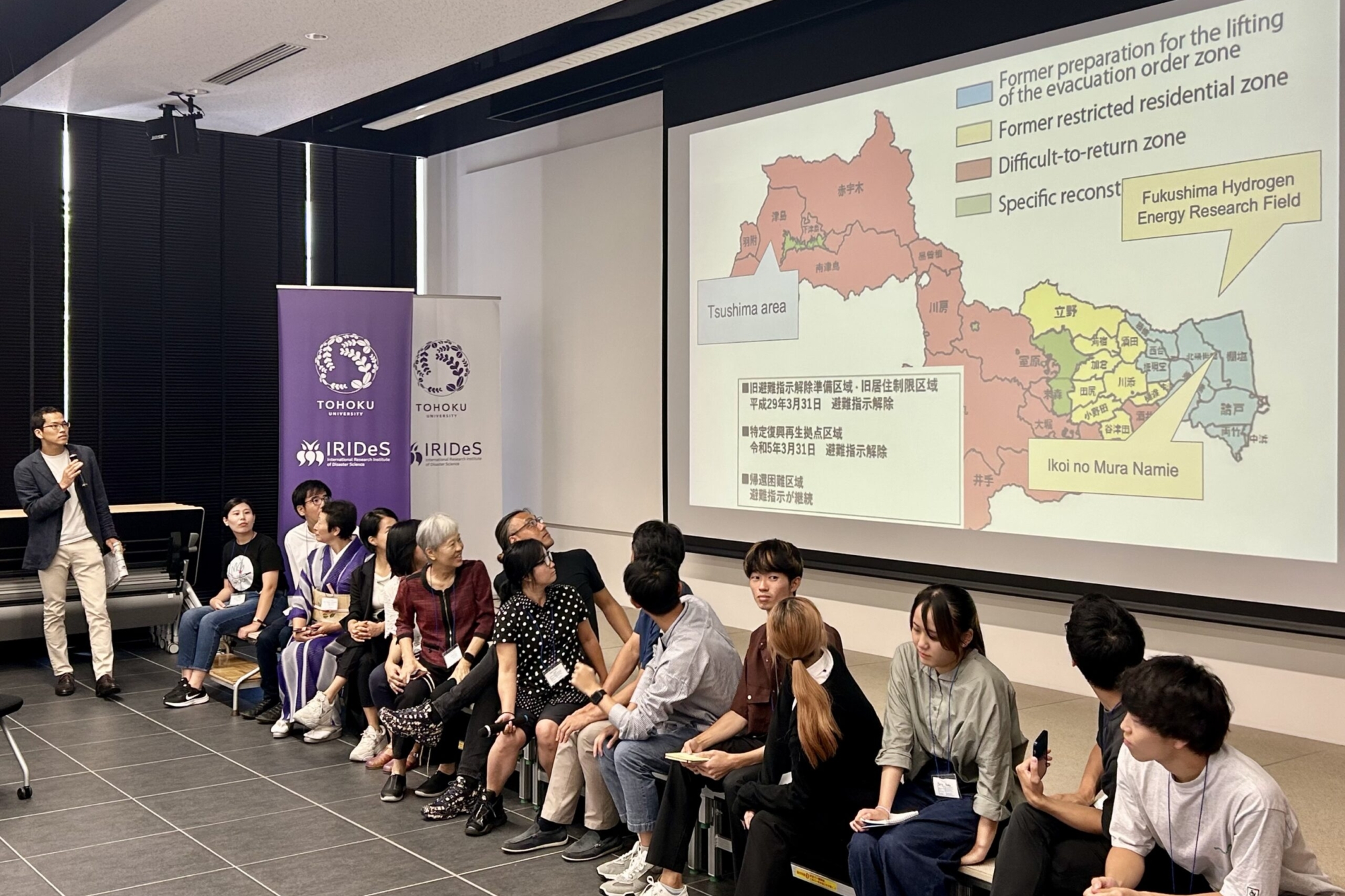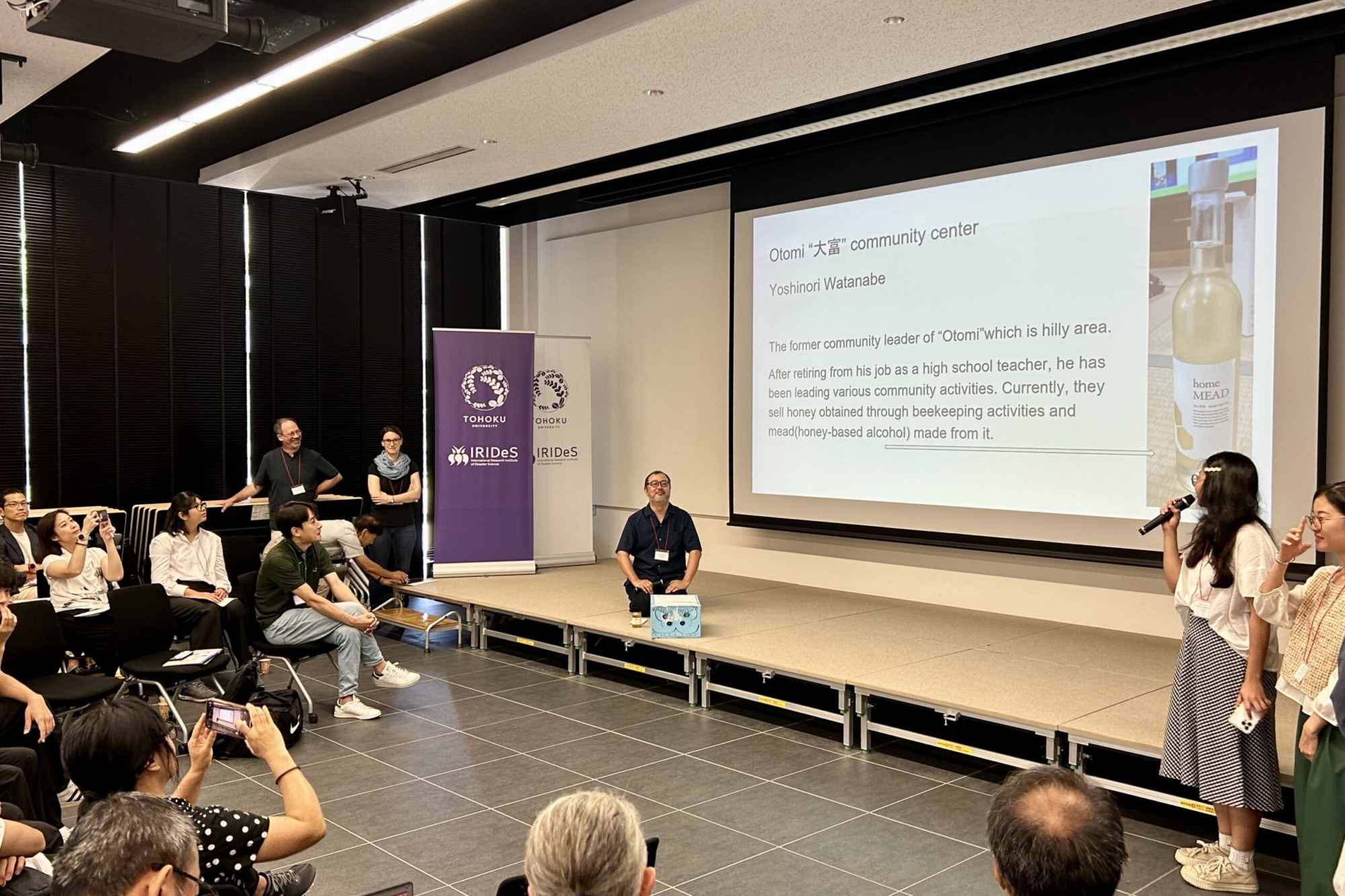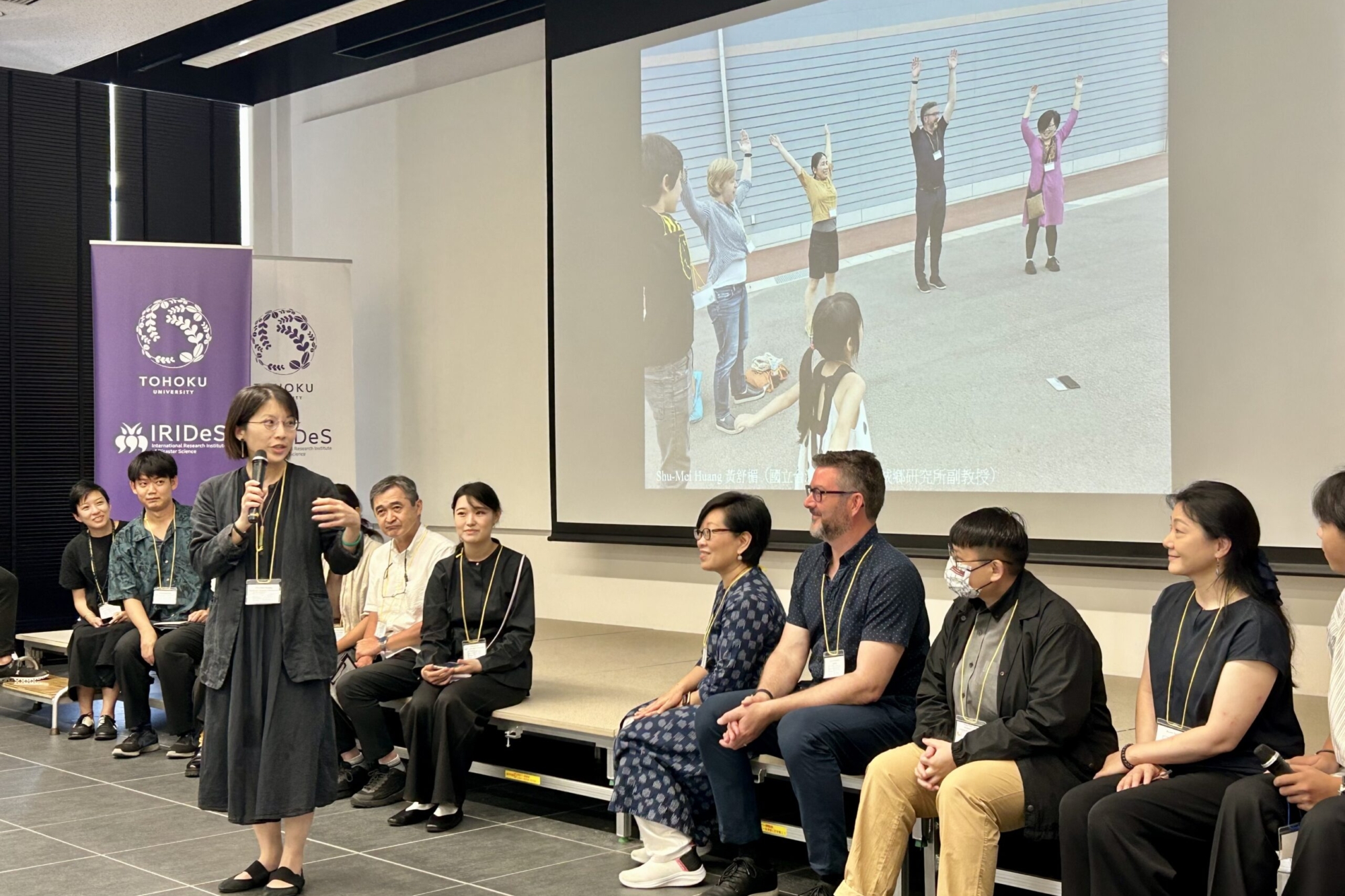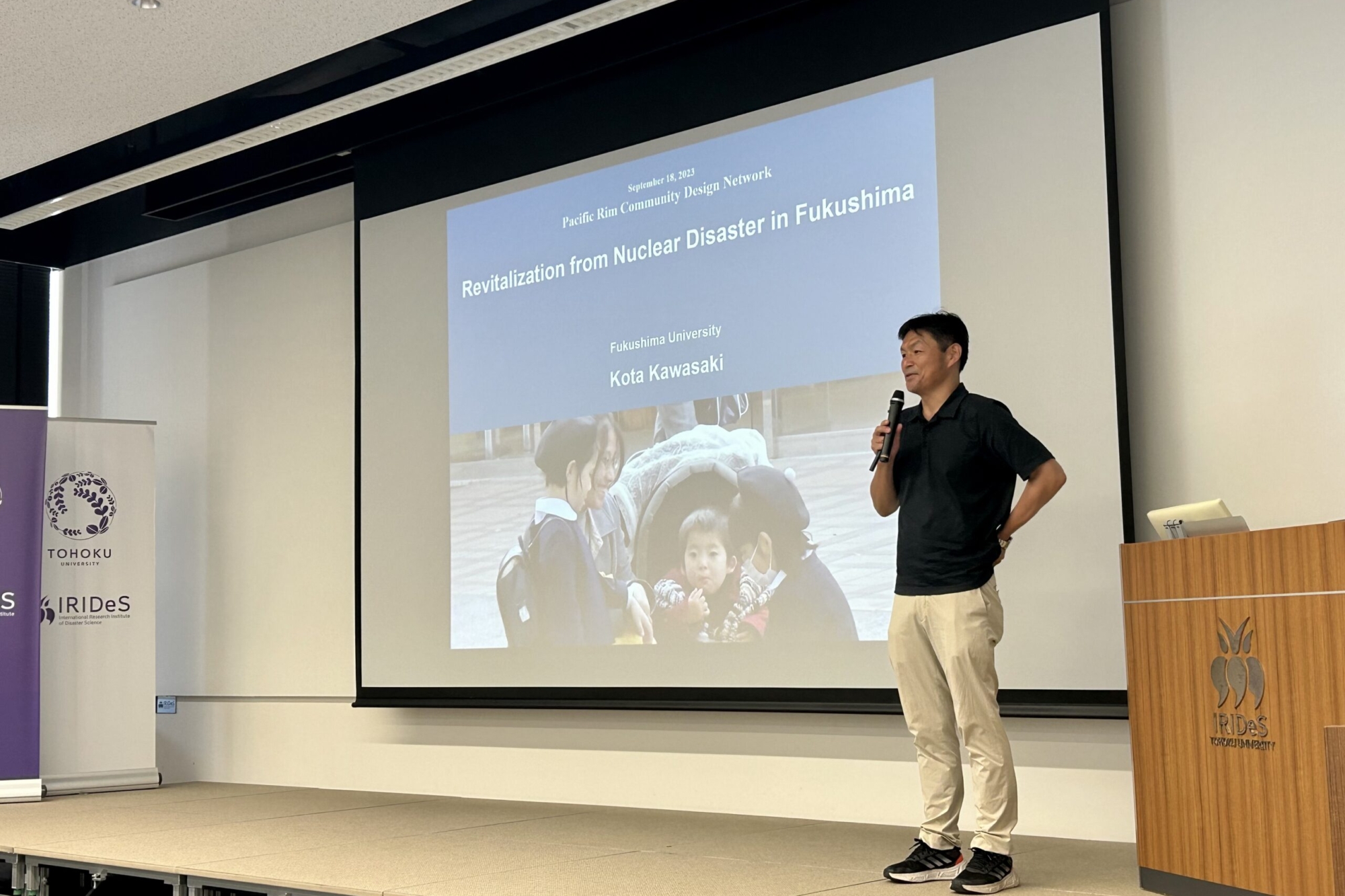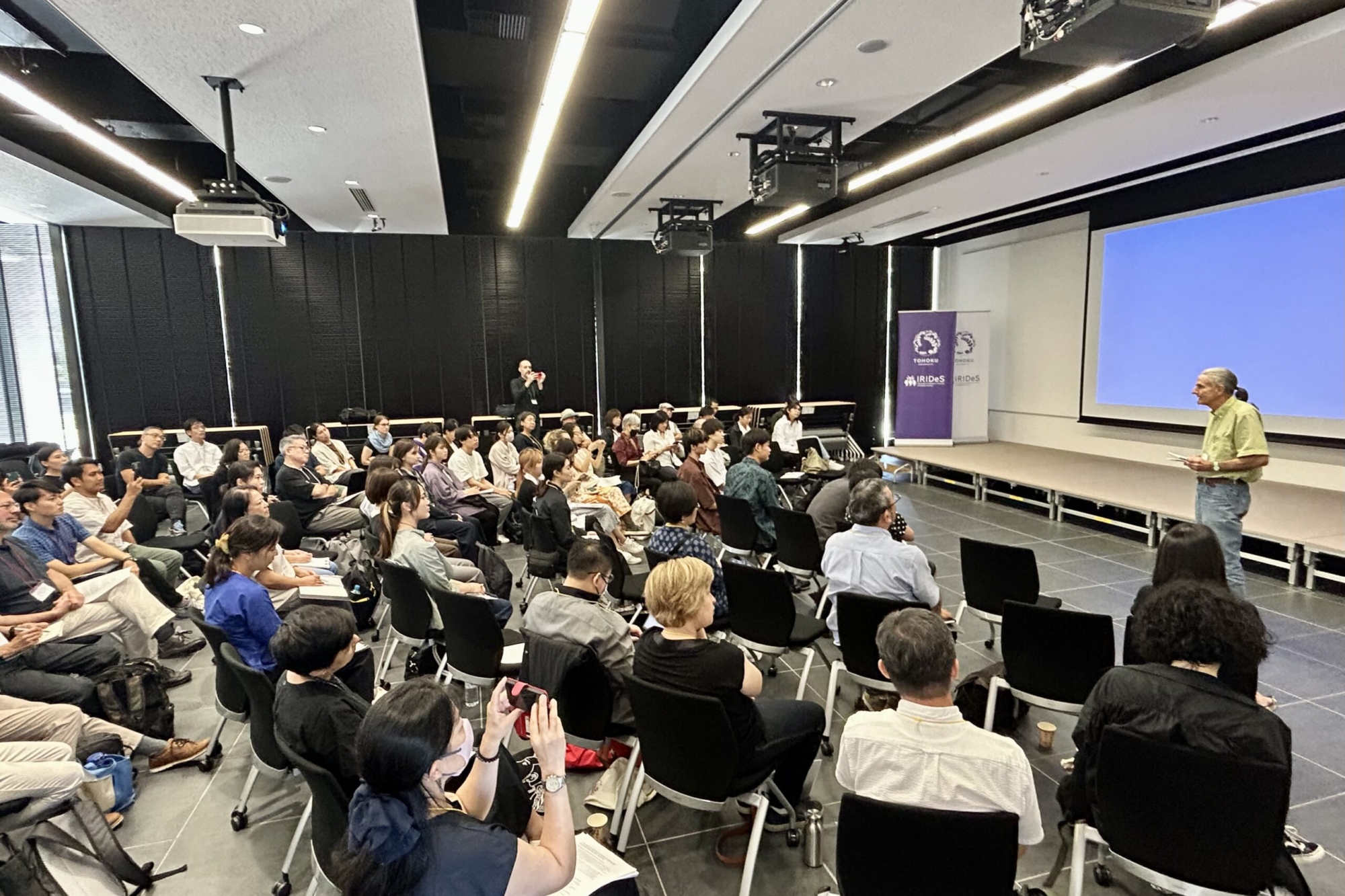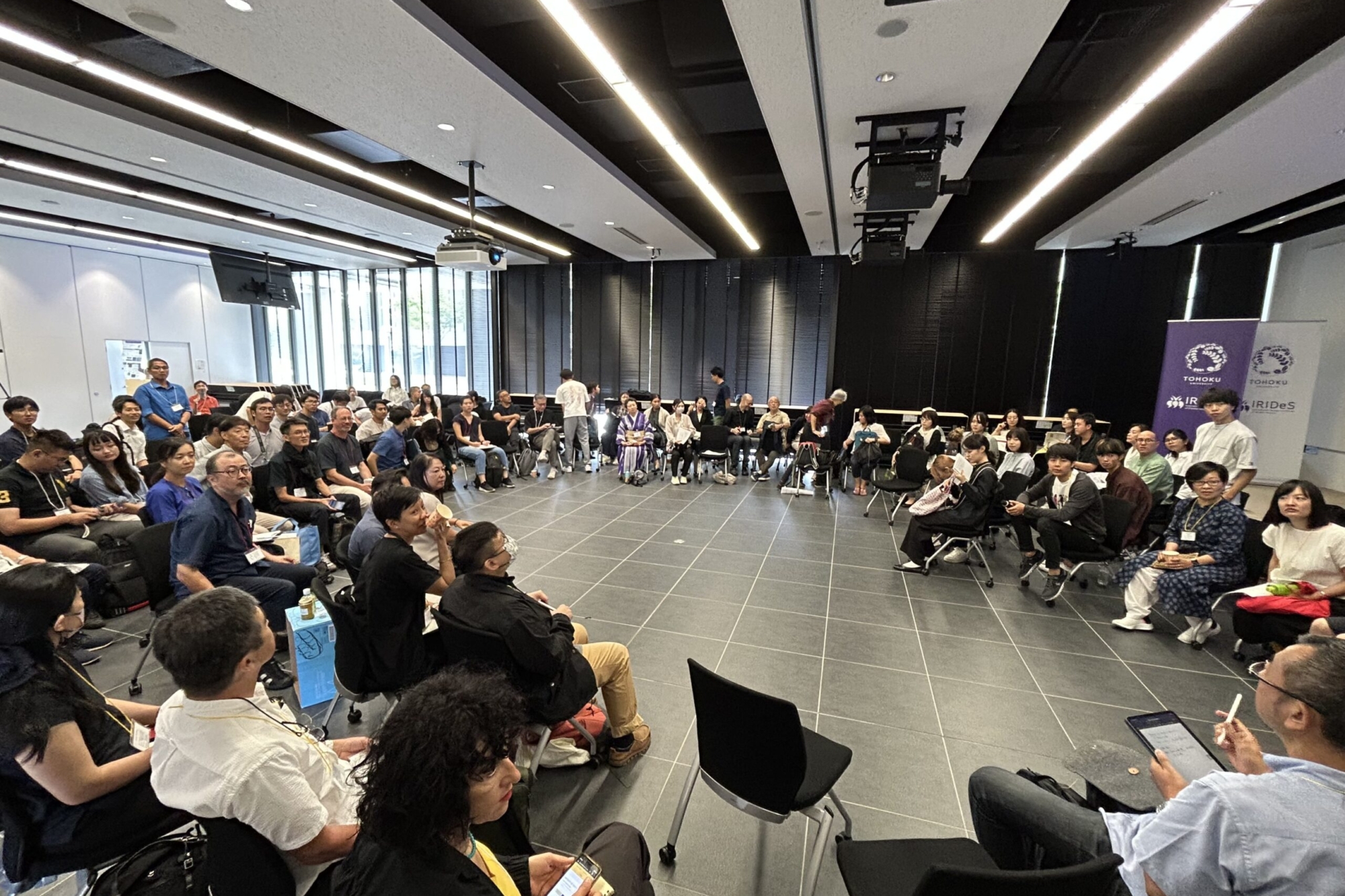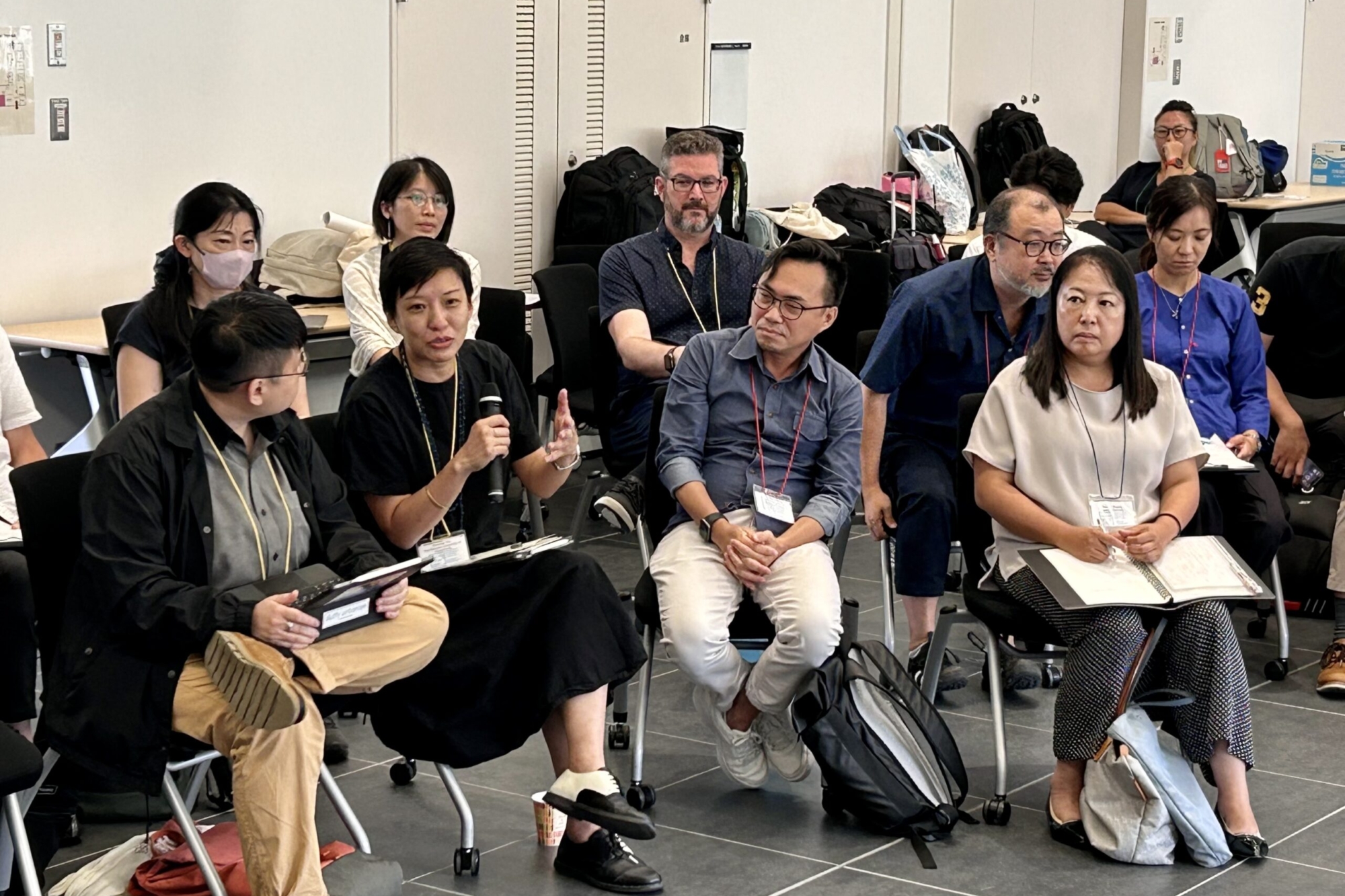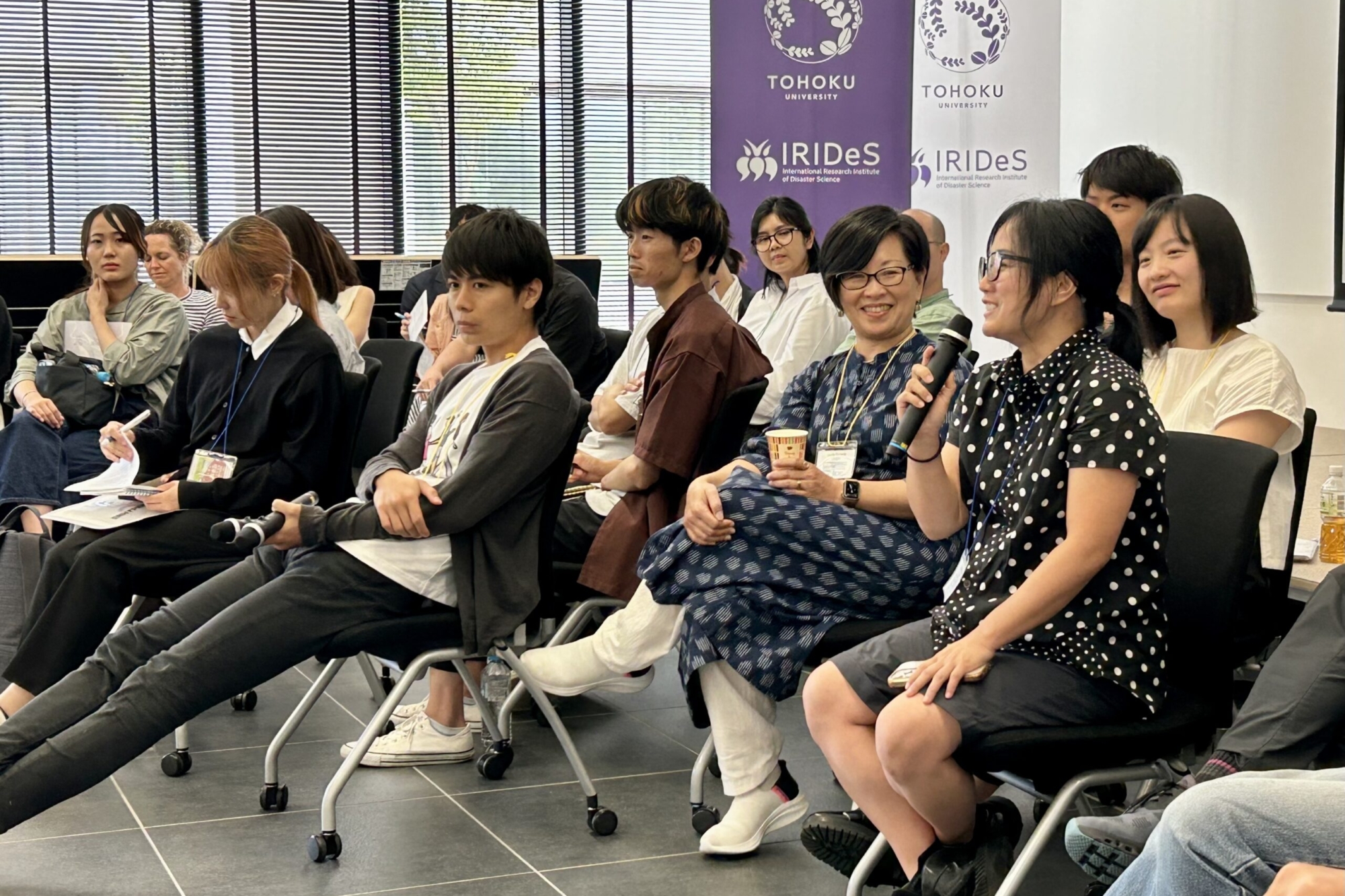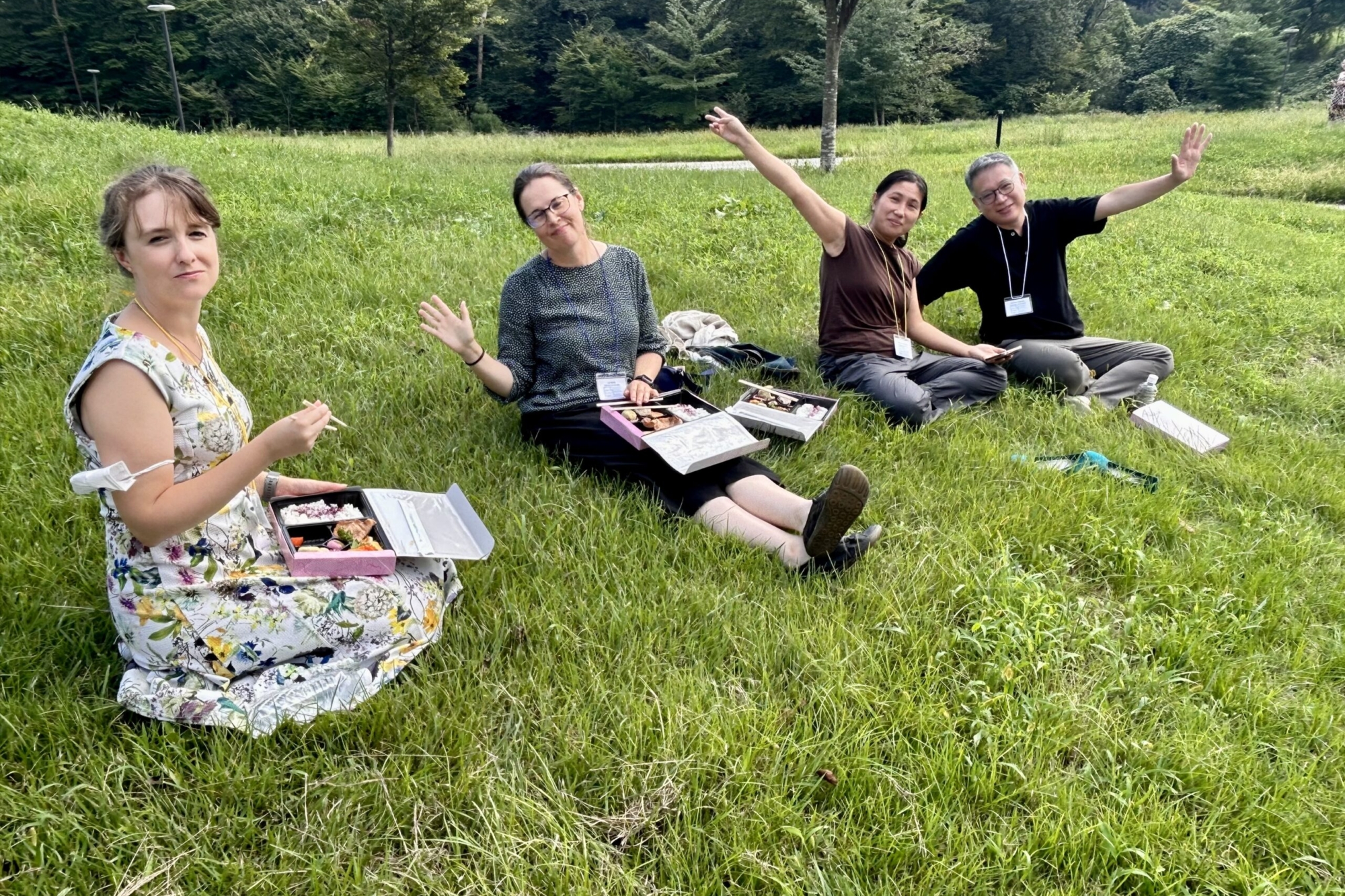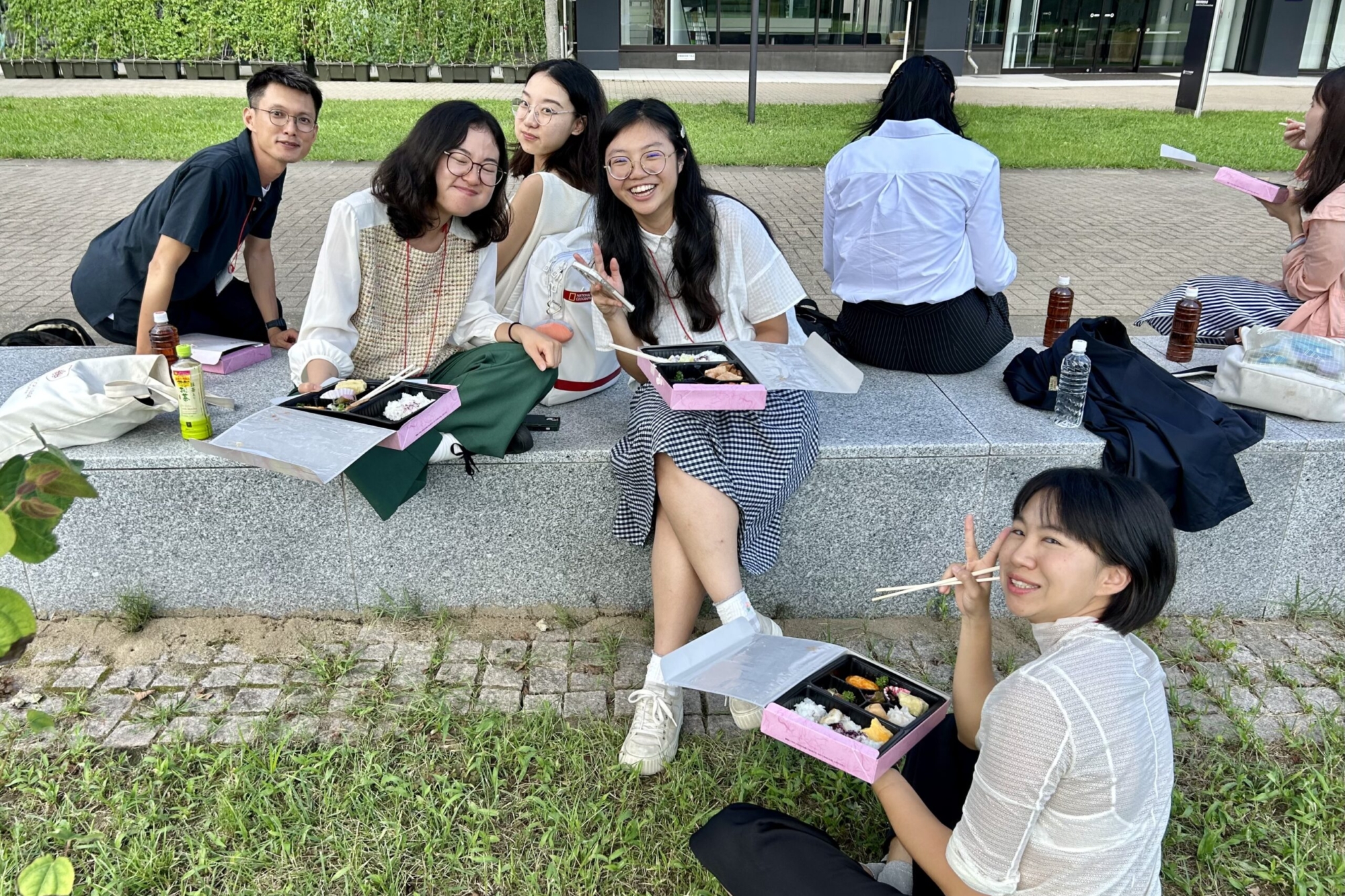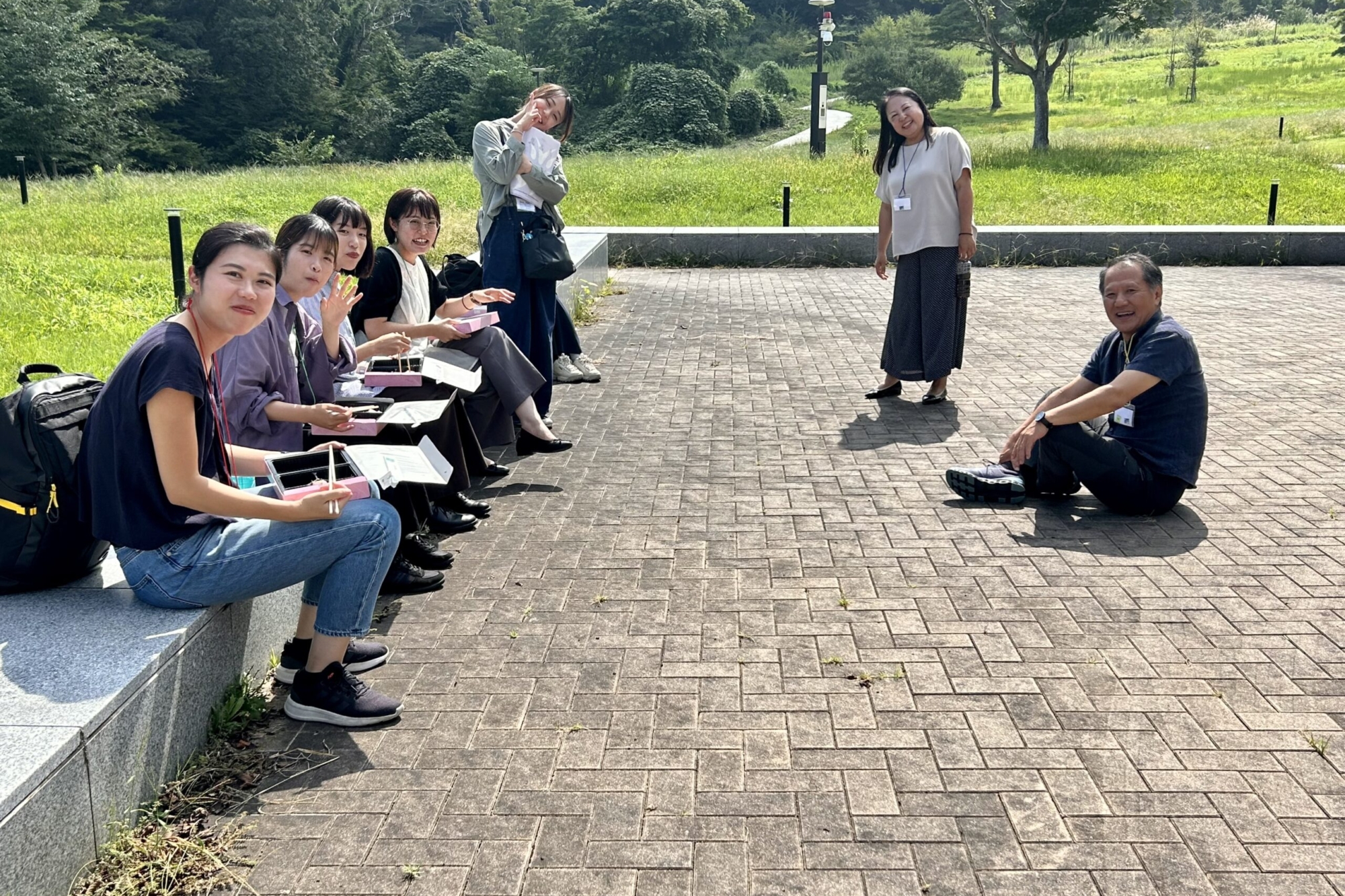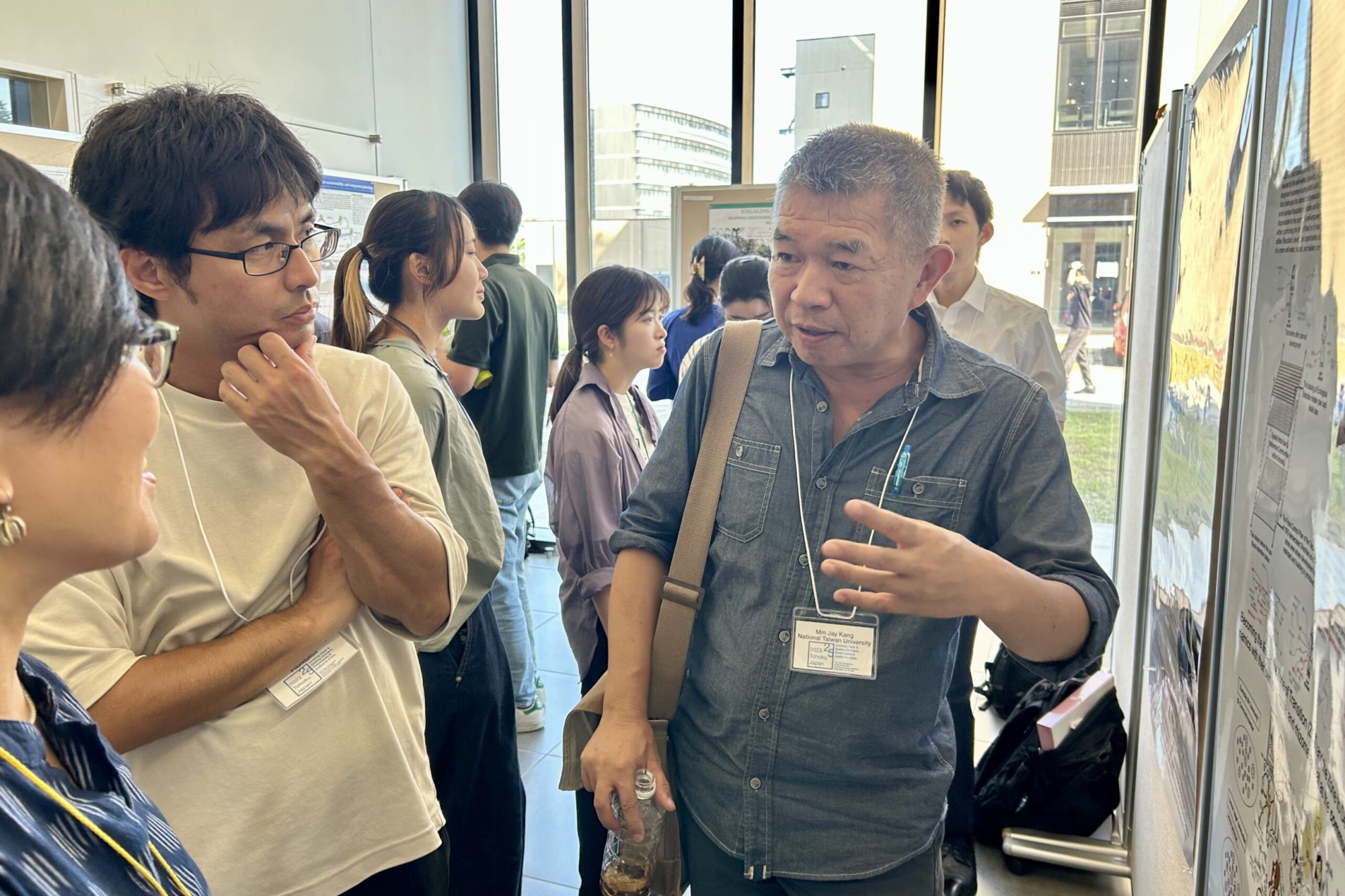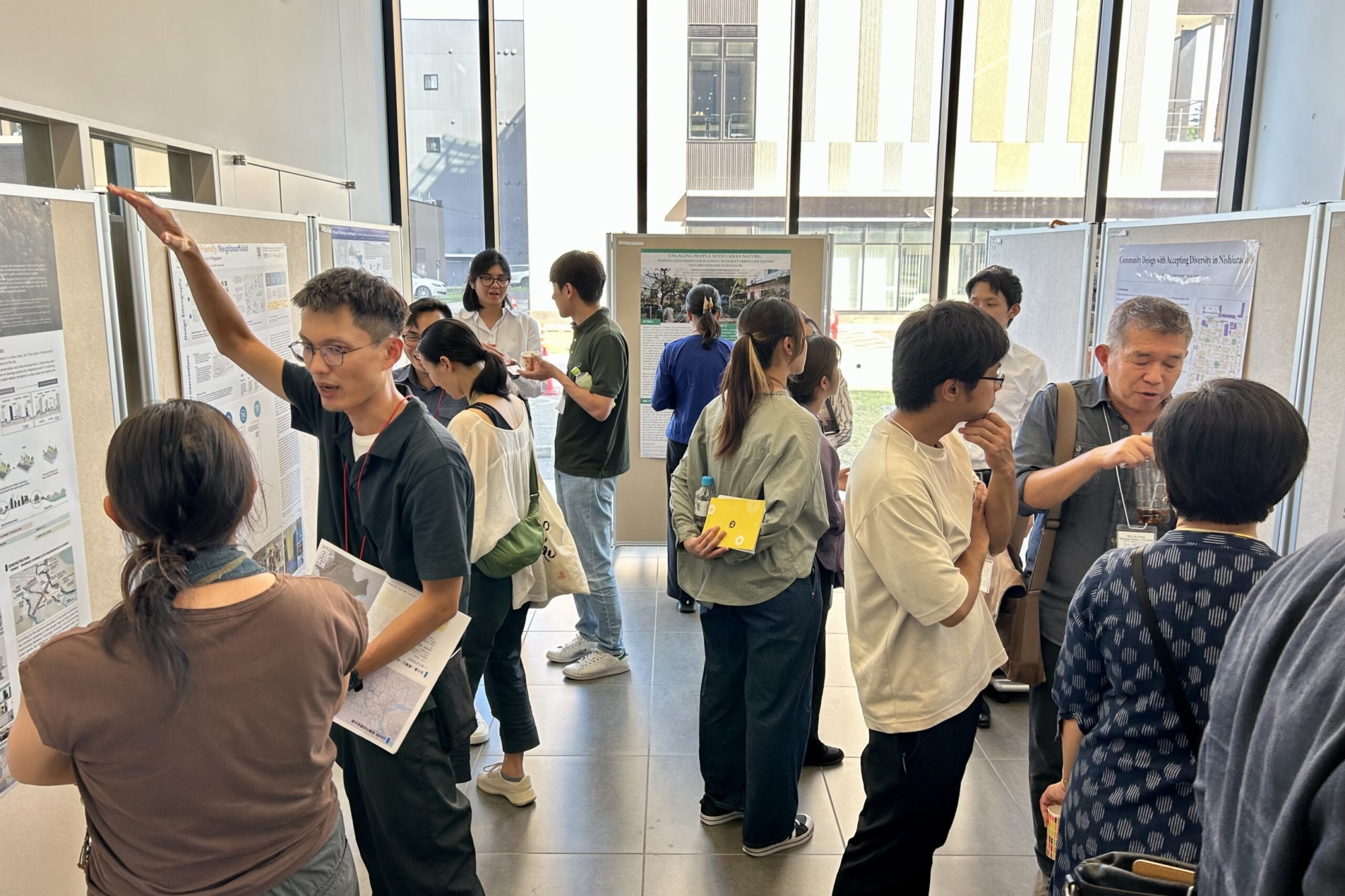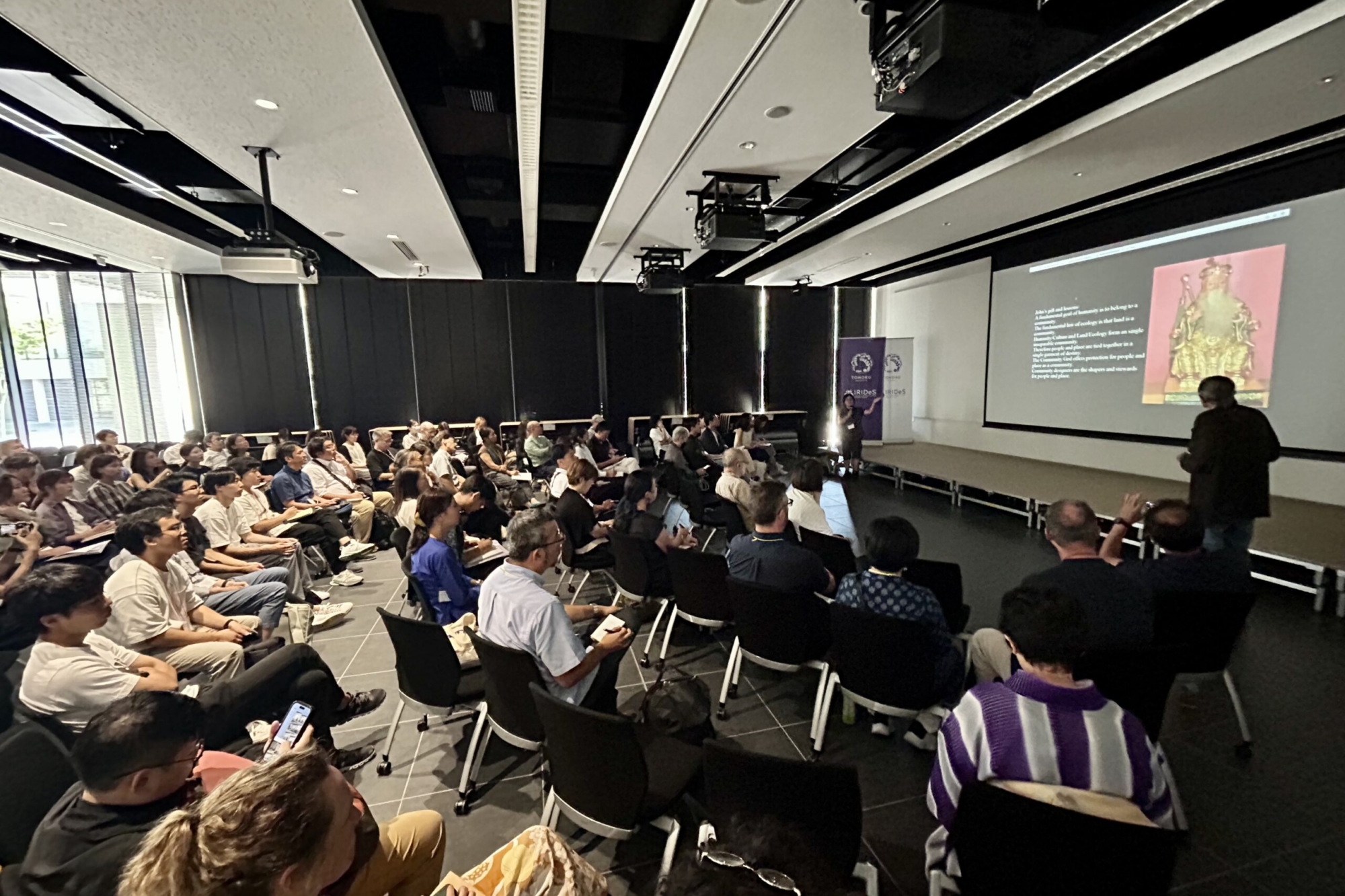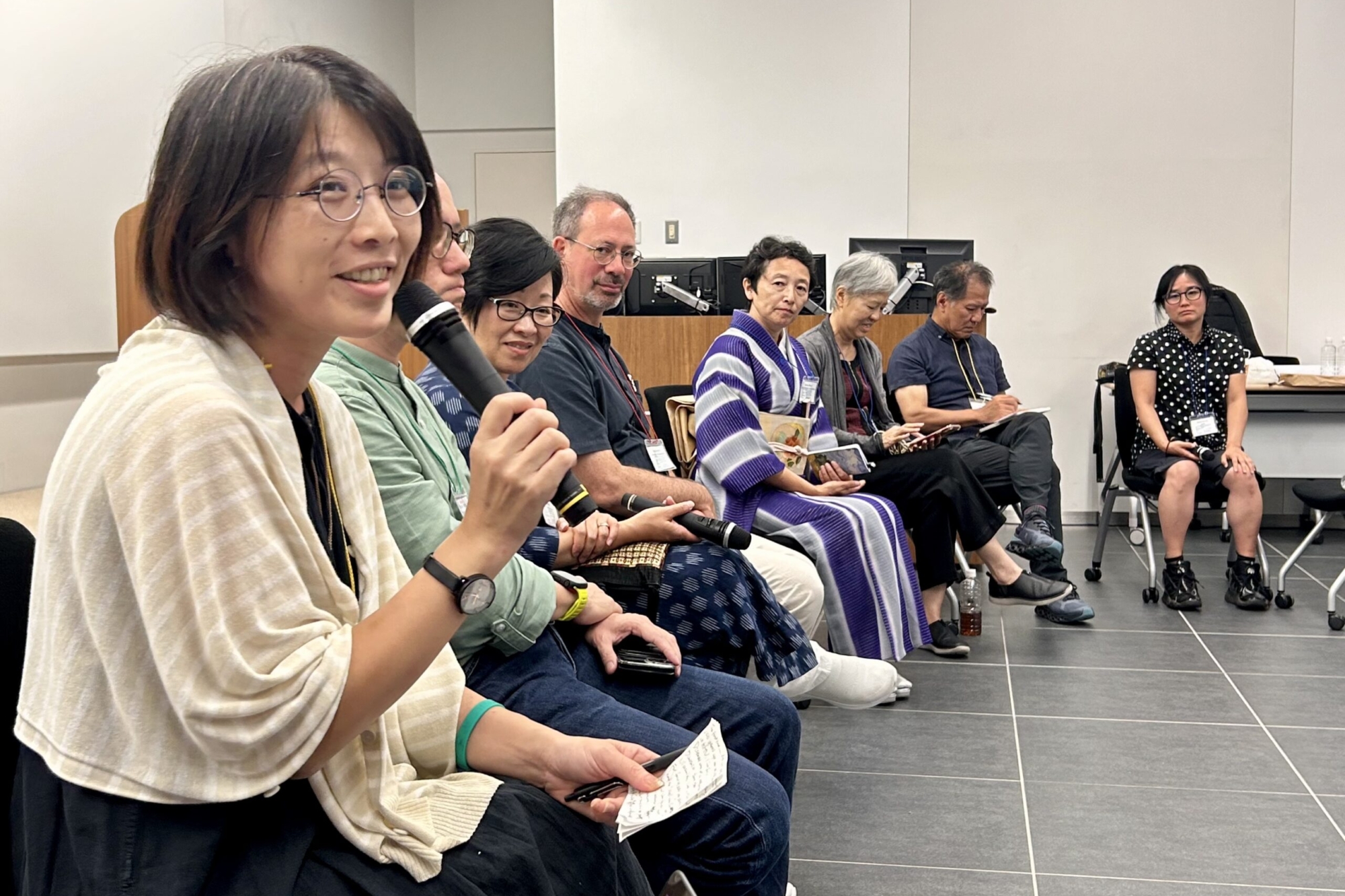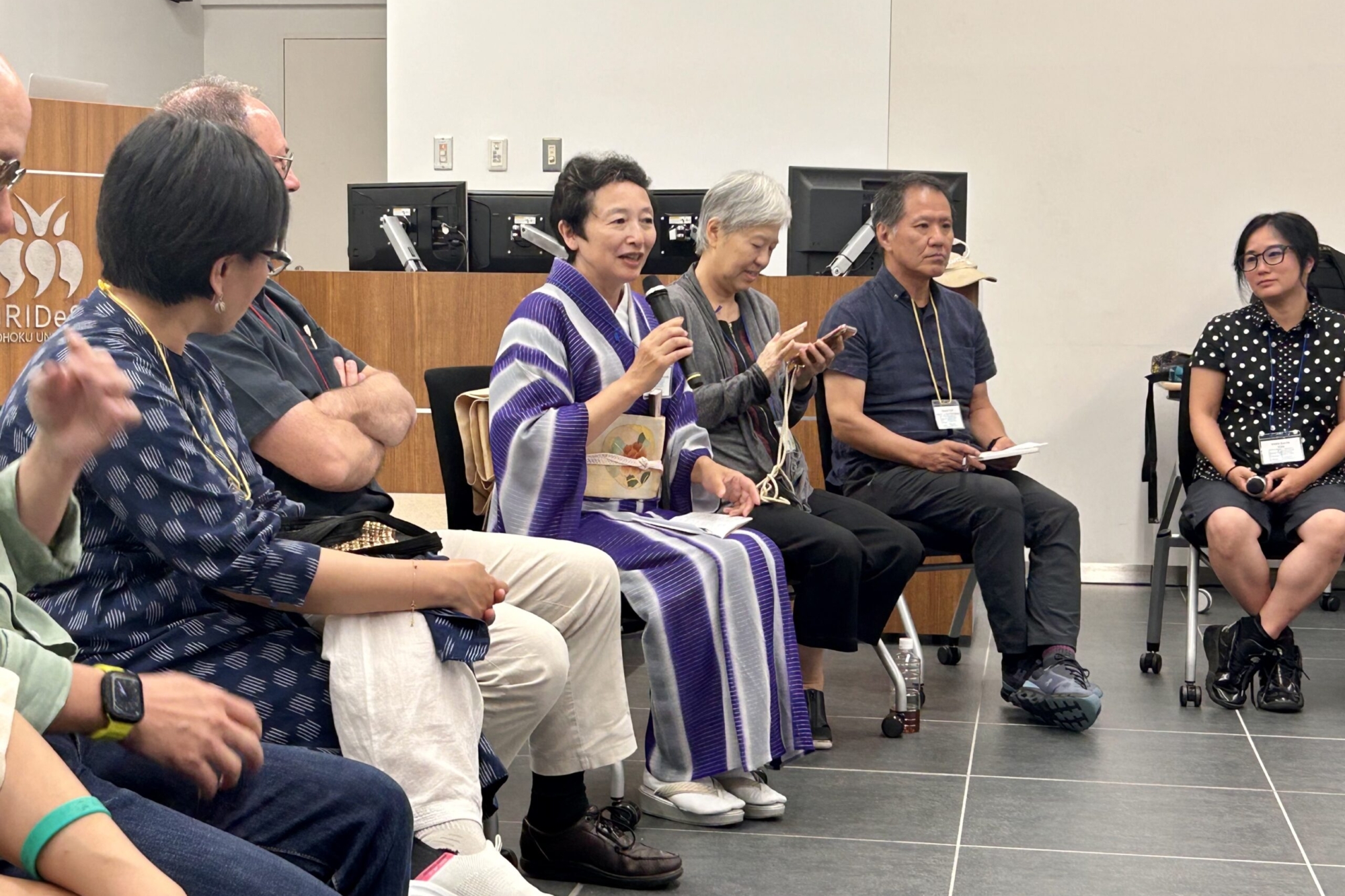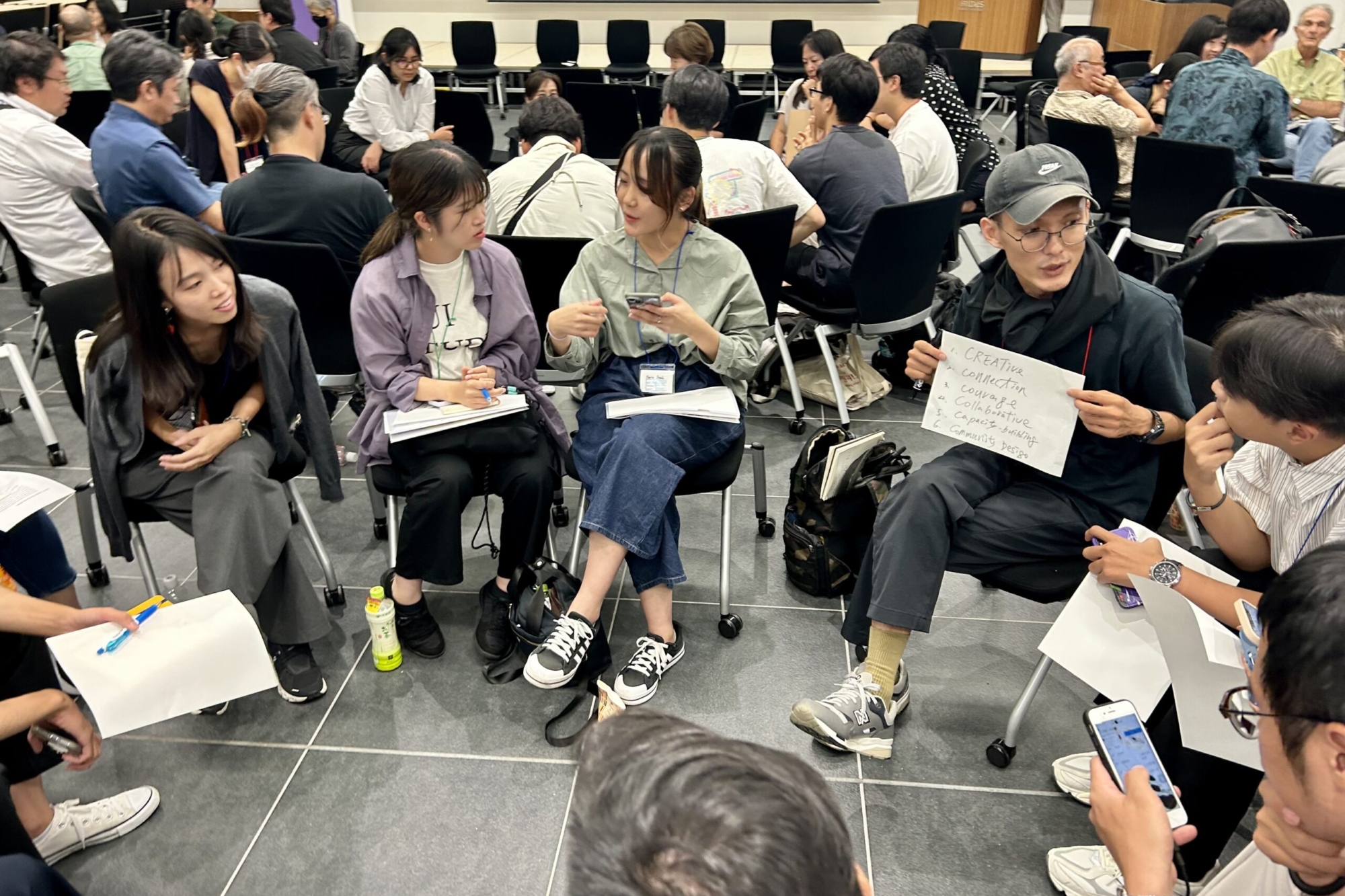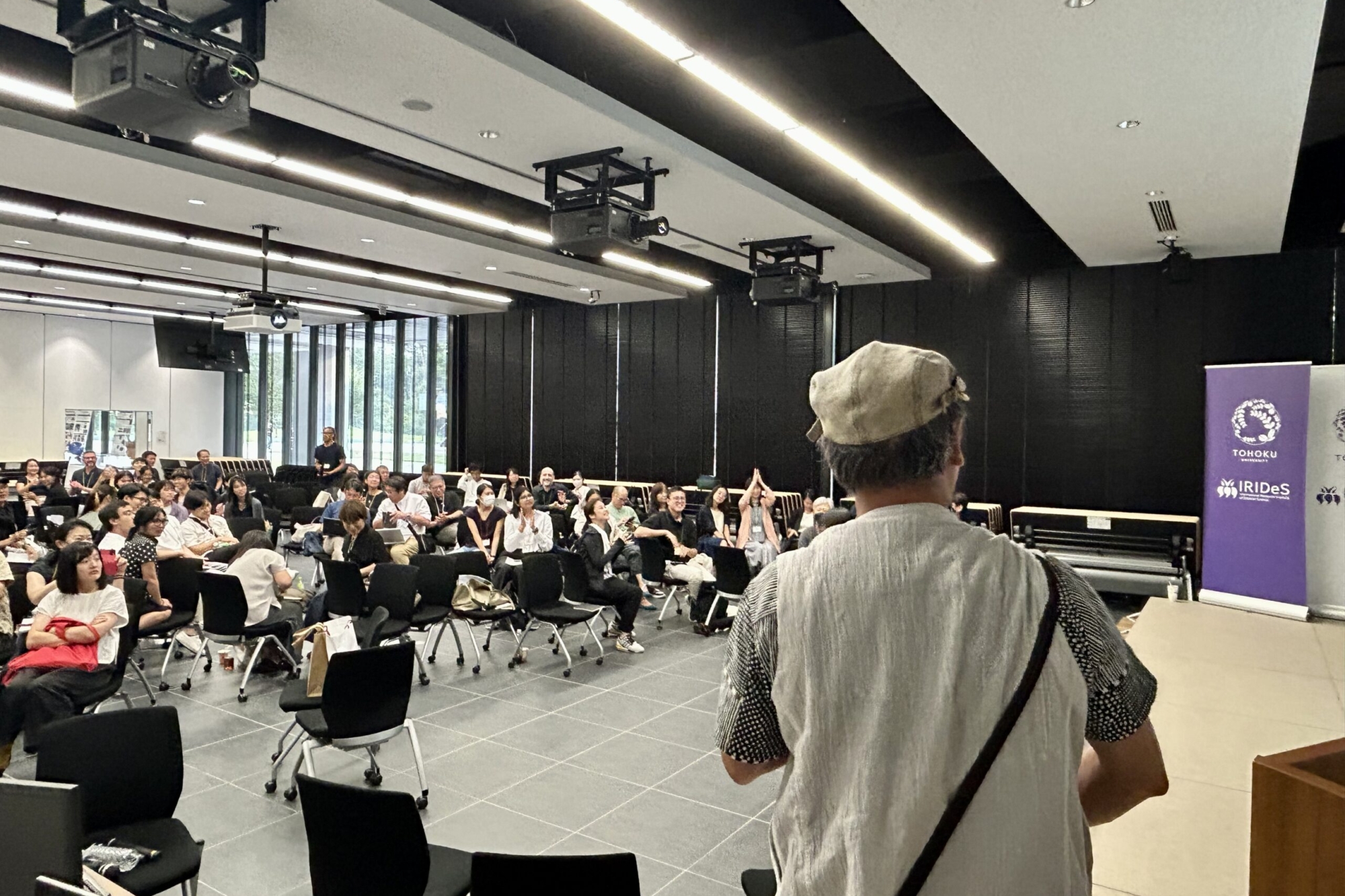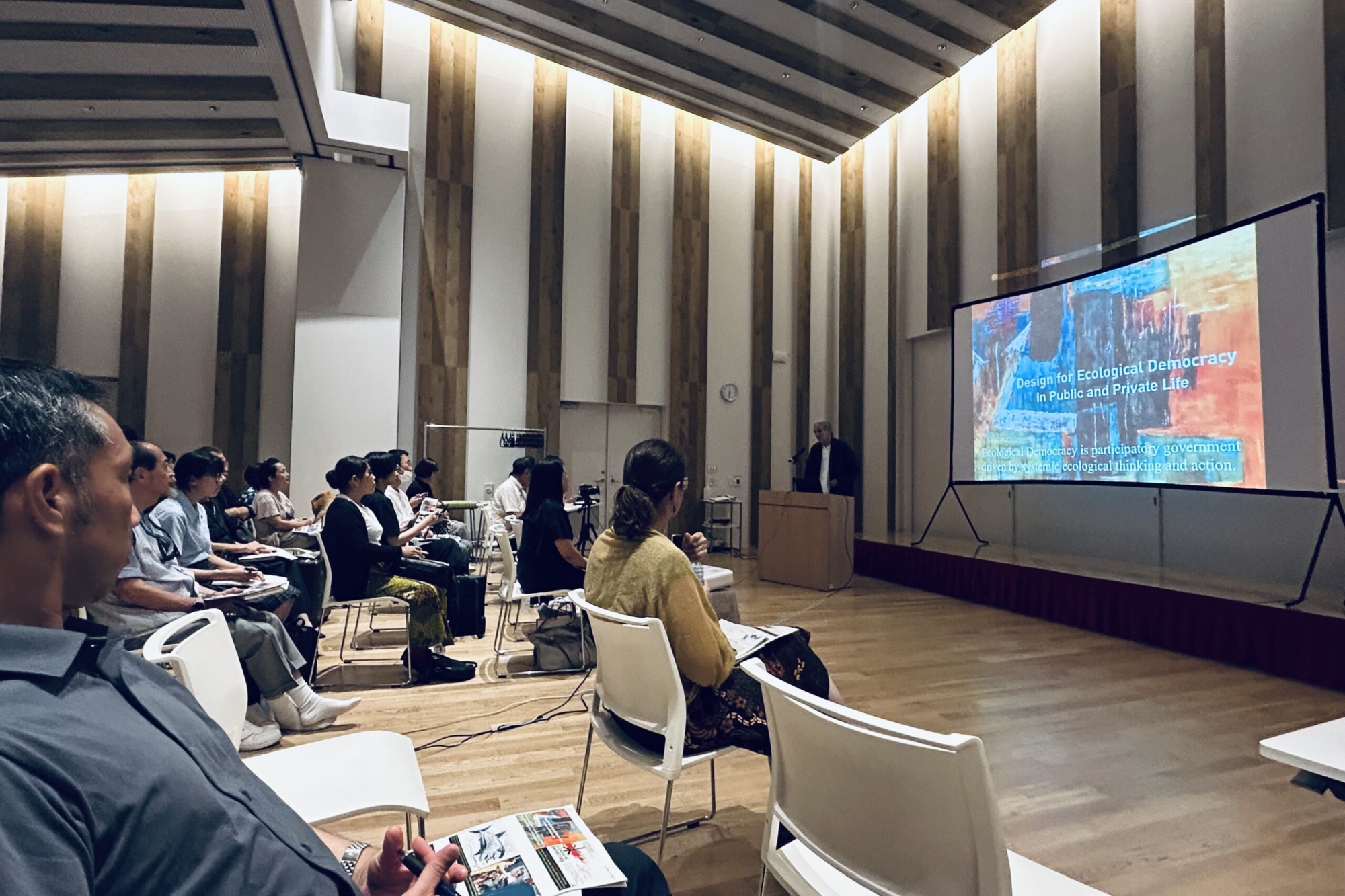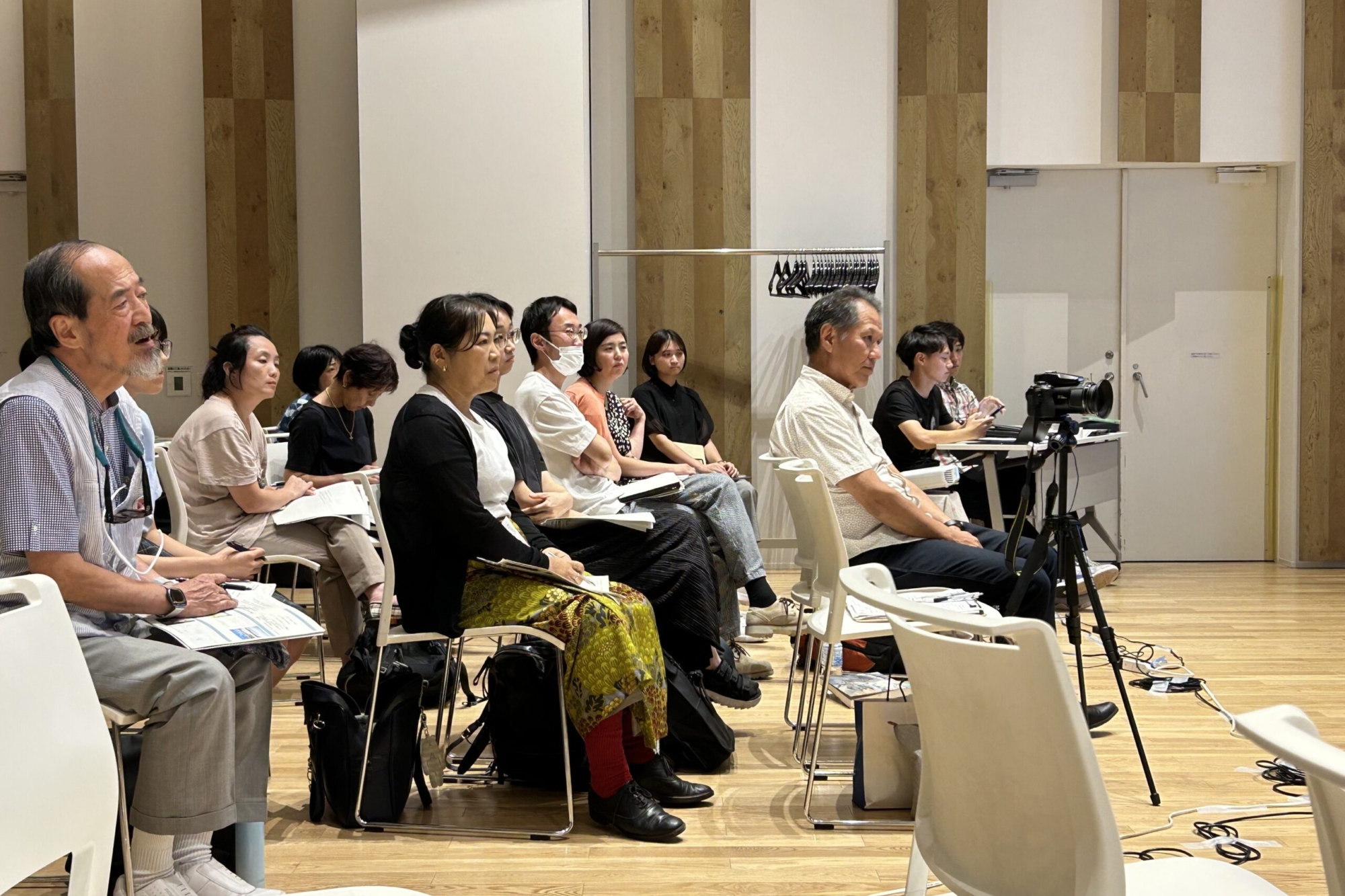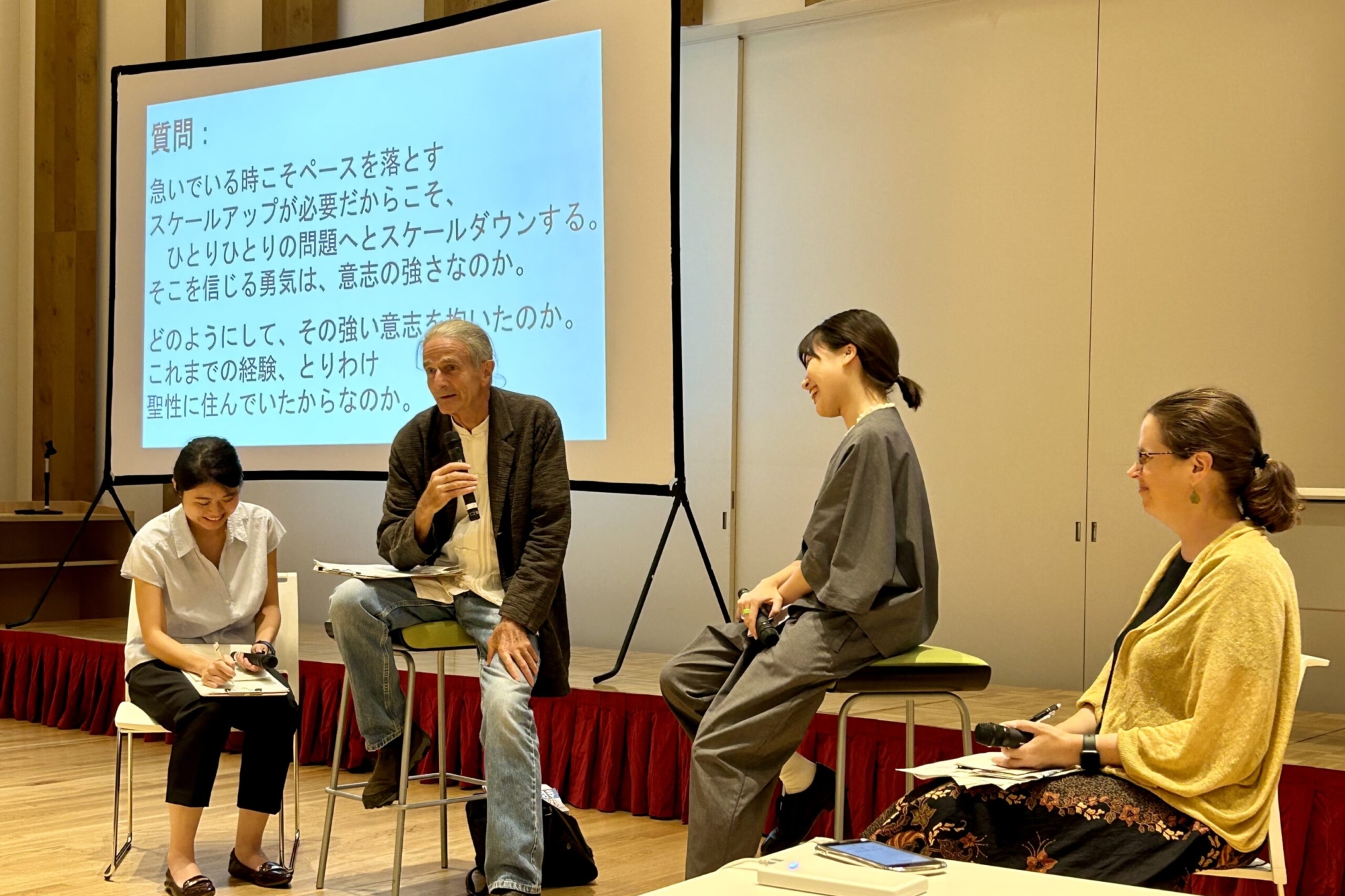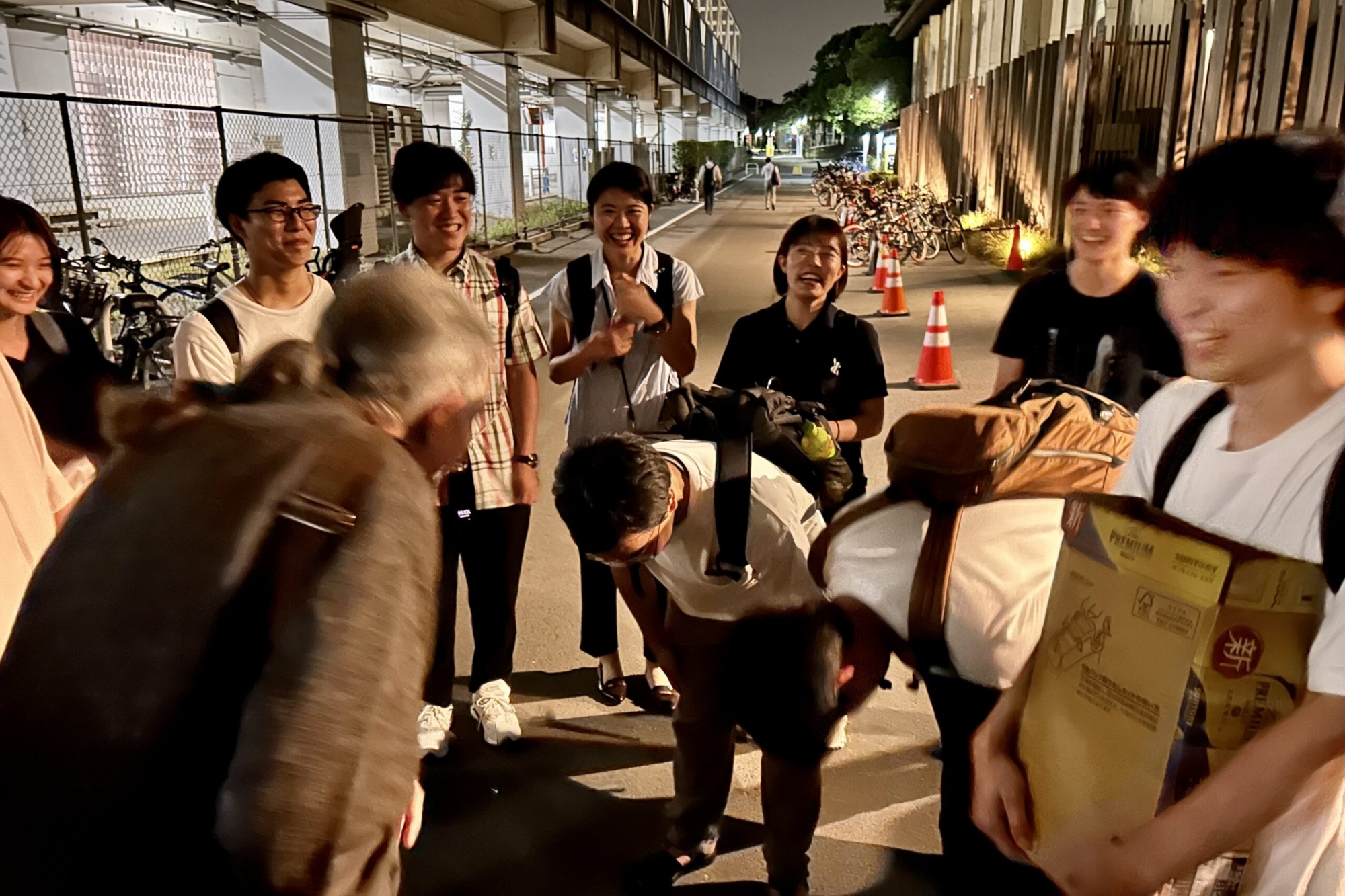Looking Back and Looking Forward: Community and Justice in Crisis: The 12th Conference of the Pacific Rim Community Design Network, Japan, September 16-18 and 20, 2023
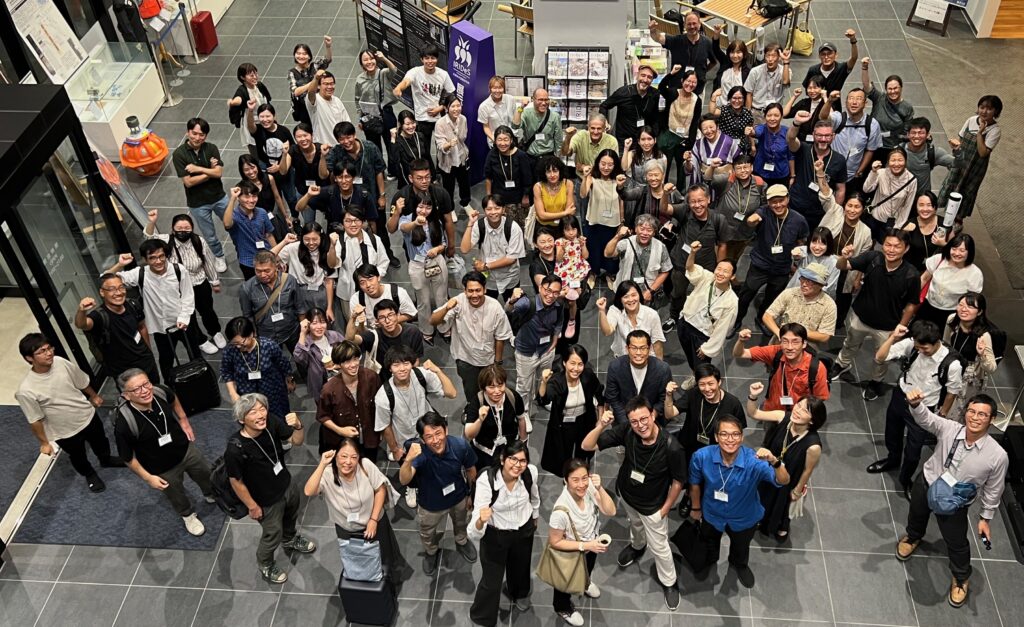
In the 25 years that have passed since the first meeting of the Pacific Rim Community Design Network in 1998, members of the network have been engaged in democratic planning and participatory design around the Pacific Rim. In addition to the 11 previous conferences, we have found other ways to engage and connect, especially during the COVID-19 pandemic. On the 25th anniversary, we invited new or old friends to return to the first gathering of the Network in Japan since 2010.
The nature of communities has changed over the past 25 years, and one of the major changes has been the expansion of disincentives for communities to continue to live where they want to live, such as widening economic disparities and growing disaster impacts from increasing natural hazard events. As a result, there is a growing and greater need for community planners to address “Justice” in cities, which encompasses social justice as well as environmental justice.
In Japan, a major event occurred in 2011 that has various implications for the “justice” of continuing to live in Japan. That was the Great East Japan Earthquake, which struck the Tohoku region of Japan was struck on March 11, 2011. With a massive earthquake and the largest tsunami in living memory, the disaster caused a nuclear meltdown in Fukushima and widespread and long-term displacement. Affected communities have faced various challenges over the 12 years since the triple disaster. Physical reconstruction, including drastic modification of the landscape and townscapes of much of the affected area, is nearly complete, after many years of planning and construction.
Empowered actions of citizen participation have emerged within post-disaster recovery machizukuri. Yet questions remain, including those related to the long-term sustainability of the region and in coastal communities, energy use, and our current ways of living. Considering questions of social and environmental justice, how should we think about ongoing recovery? How are the experiences of the disaster and recovery being remembered, shared, and conveyed to future generations, both within Japan and internationally?
The challenges are even more complex for communities affected by contamination from the nuclear meltdown at the Daiichi Nuclear Power Plant in Fukushima. Nuclear evacuees have faced long-term uncertainty and displacement, and difficult questions about if/when to return to former communities, as evacuation orders have been revised multiple times. Areas that have re-opened for people to live also struggle to revitalize communities. As recovery processes proceed, there is a separation between projects that focus on the reconstruction of towns and places and people’s needs for life recovery. (See Leave No One Behind (English) (Japanese), the proposal for a community-based and resident-centered nuclear disaster recovery vision, prefectural residents’ edition.)
As we look back at the past 25 years of the Pacific Rim Network, and together consider current and future needs for community design and action in Japan and around the Pacific Rim, we planned this conference to have a strong field research component, as participants had split into multiple small groups to visit different sites in Fukushima. The format of the conference included “small group” field visits on Sept. 16 and Sept., 17, after which we gathered for a “big table” discussion and symposium in Sendai at Tohoku University on September 18th.
Fukushima field visits: Sept 16 and Sept 17, 2023
Themes addressed included: energy, social justice, democracy, participation, education, disaster storytelling, and conveying experiences. Participants met at Sendai Station on the morning of September 16 and traveled by chartered bus to Fukushima. In small groups, the participants visited and heard from people in different affected communities and stayed in local accommodations.
“Big Table” gathering: Sept 18, 2023 (Tohoku University)
On Sept 18, conference participants gathered for a “Big Table” meeting at Tohoku University in Sendai. At the Big Table, small groups shared what they saw and heard in the last two days and discussed the current issues in Tohoku, Japan, and other countries in the Pacific Rim. The afternoon symposium included reflections on the last 25 years of the network, current needs for community design, and looking forward to the future of our work. [Final Program]
Poster presentations: Sept 18, 2023 (Tohoku University)
Along with the Big Table/Symposium, we invited participants to share their research and receive feedback through a poster presentation session on September 18th. We welcomed all poster submissions related to themes of community design in the Pacific Rim.
Tokyo symposium: Ecological Democracy/ Scaling Up Machizukuri. Sept 20, 2023
Following the gathering in Tohoku, a Symposium on Design for Ecological Democracy was held in Tokyo on September 20 in the Sereragikan in Denenchofu featuring presentations and discussion by Prof. Emeritus Randolph Hester and Ms. Koba Kanon. [Program (English / Japanese)]
Partner Organizations: IRIDeS, Tohoku University; Ecological Democracy Foundation; Pacific Rim Community Design Network
Lead Organizers: Masato Dohi, Isami Kinoshita, Hide Koizumi, Liz Maly
Contact: Liz Maly lizmaly@gmail.com, Tohoku University
Big Table Posters
(By alphabetical order; click on ‘post titles’ to view the posters)
Citizens’ Design Workshop Method for Spatial Planning Using Mixed Reality
Shin AIBA, Tokyo Metropolitan University
In citizens’ design workshops for spatial planning, communication is conducted orally, and maps, drawings, models, etc. are used as media to activate and enrich the content of the planning process. Maps, drawings, and models have been made using physical media such as paper and Styrofoam, but this study reports on a workshop methodology in which maps, drawings, and models are made using digital information and combined with physical media using Mixed Reality (MR) technology. This is the first project using MR technology in Japan. The project was a workshop to study the basic concept of utilizing the site of a former sewage treatment plant in Tokyo. Since the site was a large development site, the workshop program began by eliciting “urban issues” as felt by the participants, then examined “site utilization policies” to solve those issues, and finally examined ” ways to realize the policies” based on those policies. Four workshops were held, each introducing MR technology. The MR technology introduced was developed based on 3D-GIS and consists of (1) technology to overlay digital media on outdoor space, (2) technology to attach location information to 10-second videos and images taken outdoors and post them to 3D-GIS, (3) technology to overlay digital media such as 3D city models and building models that are recognized on postcard-sized cards on a desk, (4) technology to display comments on 3D city models, and (5) technology to post 3D city models to 3D-GIS. What makes this workshop method unique is the “quality and quantity” of information provided to the workshop using digital media, processed and fed back by the participants. Although the use of digital media improved the quality and quantity of information, there were concerns about the lack of tactile transmission and the volume of information causing confusion. This workshop method combined digital and physical media to adjust the quality and quantity of information and elicit active participation from the participants. Keywords: Citizen’s workshop, mixed reality, digital and tangible.
100 Possibilities in the Beitou Market
Guan Yu CHEN, National Taipei University of Technology
The study site is in the “Beitou Market” which is the largest publicly traditional retail market in Taipei City. With a land area of about 7,748 square meters, its northeast side faces Huanggang Road (15 meters). There is a Beitou MRT Station within 500 meters. However, the market is facing the stage of building rehabilitation. The merchants moved to the Beitou temporary market in September 2021 and the market was originally expected to be rehabilitated in May 2021. Unfortunately, it was stopped due to structural problems deciding rehabilitation or reconstruction until June 2023. The result has become a concern of residents and stalls. Keywords: Market, architecture, history.
The Great East Japan Earthquake Reconstruction and a Community Park: Case Study on Matsunami Park in Ishinomaki City, Miyagi Prefecture, Japan
Naomi CHIBA, International Research Institute of Disaster Science, Tohoku University
The Great East Japan Earthquake and Tsunami struck the Tohoku region on March 11, 2011. The disaster caused devastating damage to parks. What does a park mean for a coastal local community after 3/11? What kind of role can a park play in the recovery and rebuilding process for local residents with people from outside? What does a park activity offer regarding participation, education, disaster storytelling, and conveying experiences? Keywords: Park, community, 3.11
Dementia Friendly Neighbourhood: Design Ethnographic Study in Singapore
Keng Hua CHONG, Singapore University of Technology and Design (SUTD)
Dementia has become a serious and urgent issue as Singapore is ageing rapidly. About 92,000 people are estimated to be living with dementia today, and the number will almost double to 152,000 by 2030. While accessing outdoor spaces and facilities will provide a stimulus that promotes better cognitive function among the elderlies, many people living with dementia (PLWDs) are housebound because the present outdoor environments are not purposefully designed to support them in walking and navigating in their local neighbourhoods. Overseas guidelines for the dementia-friendly design are also less applicable to Singapore’s high-rise, high-density, hyper-sensorial context. More evidence-based design is thus needed to ensure environmental justice for PLWDs and their caregivers. The research began with engaging ten pairs of PLWDs and their caregivers through a design ethnography approach to testing a predefined set of ten hypothesised characteristics of a dementia-friendly neighbourhood: Familiarity, Legibility, Accessibility, Comfort, Safety, Choice, Continuity, Engaging, Delightful, Purposeful. Instead of traditional interviews which may be overly intrusive or cognitively demanding, a unique participatory method called “Jigsaw Mood Board‚” was developed as an “in-between” region to allow PLWDs to express their responses in non-verbal way. Similar to jigsaw puzzles that were used in senior daycare centres, PLWD participants were given a set of pictures with different features in the neighbourhood, and were asked to select the puzzles to form a mood board that would constitute their “best day in the neighbourhood.” This was complemented by an in-depth interview with their caregivers, to further understand their daily routines, lifestyles, aspirations, and the links (if any) to the ten hypotheses. Keywords: Dementia, inclusive design, neighbourhood design, design ethnography, environmental justice
“Just Do It!” Building Community Resilience through Creative Depopulation in Kamiyama
Simone Shu-Yeng CHUNG, National University of Singapore
The compounded disasters of the 2011 Tohoku Earthquake constituted a social catalyst that prompted many to reevaluate their expectations in life and search for new ways of living and working with nature. In the aftermath, there was a sharp increase in out-migration from Tohoku and Kanto to distant regions in the south due to concerns over long-term radiation. As a result, smaller cities and rural towns that were experiencing acute depopulation were benefitting from this migration trend. Foregrounding quality of life over material concerns, the fresh start emboldened I-turn migrants to learn new trades and initiate D.I.Y. projects they previously had neither the opportunity nor time to pursue. This presentation explores the flourishing of creative communities and inventive ground-up projects taking place in nature, with nature, through the case study of Kamiyama, a verdant mountain town on Shikoku Island. Regeneration spearheaded by Green Valley Inc., a grassroots NPO, leverages the appeal of Kamiyama’s natural environment and resources to promote socio-ecological sustainability alongside growing a circular economy. Rather than replenishing the residential population in quantitative terms, the “creative depopulation” strategy adopted here focuses on supporting in-migrants and their artisanal start-ups to raise self-sufficiency while easing the reliance on commercial agriculture. Woven into endogenous “Satoyama” practices are alternative forest thinning initiatives aimed at restoring ecological diversity through human activity as part of the collective management of the area’s landscape. Incidentally, the installation of fibre optic broadband in 2005 concurrently bolstered Kamiyama’s economic development. The earthquake’s proximity to the capital, which hosts the concentration of IT and media firms, prompted leading tech companies to set up satellite offices and data storage facilities in less urban sites between Osaka and Tokyo that had excellent internet connection yet low operating costs. By mid-2019, seventeen companies had established their presence here, sparking a local construction boom for conversions and adaptive reuse, along with the revival of vernacular building techniques and knowledge. Intangible networks connecting Kamiyama to major cities and beyond counter long-held assumptions of the urban as a fixed spatial entity. The serendipitous coalescence of extrinsic factors presenting unexpected opportunities and urgent intrinsic motivating factors helped Kamiyama make the transition from an artist village to a creative town that is a hotbed for unconventional ideas and businesses. Optimising digital technology and natural environment resources to support blended operations, coupled with a supportive community that aspires to self-sufficiency, offers a persuasive model for adoption. Keywords: Creative community, sustainability, self-sufficiency, in-migration, art projects
Disaster Risk and Planning Communication through the Use of Animated Physical Model
Kenya ENDO, National University of Singapore
A 4-dimensional model (4D model for short) is a representation method that combines a physical model with an overlay of projected animation. It allows planners and designers to illustrate anticipated changes in the future, as well as to share his/her ideas with a broader audience. This paper examines the usefulness of the 4D model, specifically in the context of the community engagement process for disaster risk mitigation and planning. A community workshop was conducted in Nagashizu as a case study, one of the heavily devastated communities along the Tohoku Coastline from the unprecedented tsunami followed by the Great East Japan Earthquake on March 11, 2011. Feedback during the workshop, regarding the usefulness of 4D model as a tool to help visualize, understand and imagine schemes for future resilience, was generally positive. For example, risk mitigation measures were discussed using the animation that explicitly illustrated the most catastrophic scenario born by the natural disaster in Nagashizu. It successfully allowed residents to realize the innate threat to their lives, which was not thoroughly recognized before the tsunami in 2011. Community-wide awareness could have mitigated the losses, by guiding all residents to take prompt evacuation actions. Participants’ suggestion on incorporating tsunami wave speed, and people’s evacuation paces into the 4D model is one of the constructive solutions that will help refine the method for future application. Likewise, compared to conventional community engagement procedures using 2-dimensional drawings, the 4D model demonstrated its greater ability to showcase the future outlook of Nagashizu both spatially and seasonally in detail. Series of rendered graphics have served to broaden participants’ imagination in the course of brainstorming potential activities that can take place in Nagashizu, not only what, but also where and when. The 4D model has smoothened the process in a way that both residents and non-residents have come together as one and exchanged ideas that interrelate with Nagashizu’s unique natural and cultural features. In terms of future prospects, the workshop outcome has suggested that the 4D model can be utilized in various purposes and phases by customizing its content. This suggestion, however, raises the question of the scalability of this methodology. This Nagashizu 4D model workshop served as a first attempt to demonstrate the potential for scaling up the methodology to other sites in the world, or even in our daily practice. Keywords: 4D model, community engagement, workshop.
Study on the Historical Significance and Reuse Project of the Iida House in Tsukudajima, Tokyo
Xiaowen GUO, Shibaura Institute of Technology
This study focuses on preserving and reusing the historic “Fish Dealer Iida House” in Tokyo’s Chuo-ku, which is at risk of demolition. The research involves a literature review, field survey, interviews, and online surveys to assess its historical value and feasibility for reuse. The study aims to provide insights into preserving historic buildings in metropolitan areas, contributing to urban cultural heritage and sustainable development. Keywords: Historical buildings, vacant house, Students’ sharing house, renovation, crowdfunding project.
Competition Over Space and Memory: Mapping the Contested Territories of the Cikasuan Communities in Taiwan
Shu-Mei Huang, National Taiwan University
“Cikasuan” means “a place of plentiful logs” in the Amis language (Sowal no ‘Amis) and has been referred to a particular Amis tribe that occupied the Chilai Plain for roughly 300 years before December 1908. The tribe of nearly 2,000 people was displaced and disbanded after the then-Japanese government forcedly dismantled their settlement and replaced it with the very first planned Japanese settlement on the east coast of Taiwan, that is, the Yoshino settlement. Most settlers came from Tokushima at that time. A shrine was built to guard the settlement, leaving relics and monuments that still can be seen today. Regarding such a small but critical part of the traditional territories of Cikasuan, the Indigenous community has been upset at the exclusive recognition of Japanese heritage there. There was no mention of Cikasuan but the Yoshino settlement. The absence of Cikasuan histories continued throughout the Japanese colonial period and the post-war years for the resettlement by other ethnic groups, such as Hakka or other Indigenous communities, continuously prevented the Cikasuan community from coming back to their ancestral territories. The most recent state-led effort to support the bottom-up, Indigenous re-telling of the past under the policy “Indigenous Historic Transitional Justice” offered a rare opportunity for the Cikasuan community to restore their history in place, at least theoretically. The Indigenous community of Cikasuan has been planning to set up an exhibition pavilion and to build a memorial plaza to accommodate commemoration events and educational activities and they really wish to take this chance. Yet, when it comes to remaking the particular site, the Cikasuan community found itself struggling among the post-war settlers and their preference for a recreational park with a limited sense of multiculturalism rather than a full dedication to Cikasuan history. Under the idea of O Cikasuan kami (meaning “People of Cikasuan, let’s get together”) from March 2022 to May 2023, we worked with the Indigenous community of Cikasuan to reidentify landmarks that were significant for them to reiterate their stories and also to navigate the placemaking over the contested public space. Keywords: Indigenous historical memories, displacement, commemoration, public space, territories.
Bottom-Up Civic Resilience: Learning from Pandemic Mutual Aid Responses in the Asia-Pacific
Jeff HOU, University of Washington, Seattle
Civil society responses including self-help and mutual aid have played an important role in addressing the COVID-19 crisis around the world, including the Pacific Rim. They represent a form of bottom-up resilience, grassroots actions by citizens and communities to cope with and adapt to social, economic, and environmental disturbances. But how exactly did communities and social groups in Asia self-organize to address challenges during the pandemic, particularly those facing the most vulnerable populations in society? What did these cases have in common? What can we learn from these civil society responses for future planning? What were the roles of researchers, spatial planning professionals, and institutions in strengthening community resilience? This poster will present outcomes from a two-part webinar titled “Bottom-Up Resilience” from July 2020, organized by the Pacific Rim Community Design Network featuring activists, organizers, and researchers from Hong Kong, Manila, Shanghai, Singapore, Taipei, and Tokyo. Cases included voluntary efforts by a wide range of actors to support migrant workers, street vendors, healthcare workers, and people experiencing homelessness as well as mutual aid efforts among strangers during lockdowns. Findings include contrasting responses from institutions and civil society actors, how the civil society responses have built upon and expanded trust and empathy in a given place, how they scale up, and how the scalability has depended heavily on solidarity and collaboration. The poster further illustrates how these efforts represent a form of community resilience, the continued barriers, and the implications for community design practices. Keywords: Pandemic, community resilience, mutual aid, self-help, Asia-Pacific.
A Review of Community-Based Forest Enterprises (CBFEs) in Korea through a CHANS Approach
Yun Hye HWANG, National University of Singapore
In recent decades, social forestry has gained recognition for its potential to support sustainable livelihoods, mitigate carbon emissions, and address biodiversity loss, especially in the age of Anthropocene. Along with the growing interest in social forestry in Korea, Community-Based Forest Enterprises (CBFEs) have been successfully implemented for the last decade. Nevertheless, a comprehensive study encompassing the ecological and socio-economic impacts of CBFEs across multiple hierarchical levels has yet to be conducted. This research uses a Coupled Human and Natural Systems (CHANS) framework to conceptualize/understand the social processes of CBFEs in Korea. Profiles and geospatial data of over 180 CBFEs funded by the Korea Forest Service were analyzed in terms of geographical context, dependency on local resources, and types of ecosystem services provided. The results show that CBFEs focused on cultural ecosystem services such as recreation, health, and environmental education were the most prominent (74.8%), while regulating ecosystem services such as food provision and biodiversity enhancement were less considered. Only around half of CBFEs (52%) were dependent on site-specific resources including locally-produced materials or natural resources. This is a decreasing trend, as monetary profit is insignificant in most cases. Results also suggest that the majority of CBFEs prioritize accessibility, and are located near major highways, rather than large forests (protected nature areas). Despite limitations in the analysis, this study provides policymakers, researchers, and communities with integrated socio-ecological insights to improve natural and human resource management toward sustainable social forestry. Keywords: Community-based forest enterprises, coupled human and natural system, Korea Forest Service, sustainable natural and human resource management, circularity.
From ZOT to ZAD: Exploring the Root Route and Rhizome of Taipei’s Shezidao
Min Jay KANG, National Taiwan University
Over the past few decades, Shezidao (Shezi Island) has been prohibited from building and developing due to the constraints of the “restricted development zone” demarcated by the Flood Prevention Plan of the Taipei Metropolitan Area, and trapped in a conundrum of involuntary suspension of growth ever since. The previous city government of Taipei then proposed a master plan of Ecological Shezidao under the premise of “zone expropriation” that implied wholesale demolition of the existing landscapes and settlements. Those who refused to undergo the eradication of their homelands or were predestinated to be forced to relocate elsewhere in the future started to self-organize and protest in every plan review meeting and public hearing. But in between the struggle of planning and protests, everyday life continues in the deferred indeterminacy and provides the material foundation for the ritual demonstrations against the planning bulldozers. We intend to explore the socio-material assemblage effect within the status of Shezidao’s “permanent transition” and further comprehend the likely communitas that evolved from its extended liminality. This research also aims to mediate the complex interlocking of time and space and tackle the daily dynamics of Shezidao’s constrained “transitional” status. Following a series of in-depth interviews and participant observations, we then track down the root, route, and rhizome of Shezidao’s exile landscape and how the zone of transition (ZOT) subtly metamorphizes itself into a kind of ZAD (zone’s defender, zone to defend). The intertwining of local residents’ perceivable and embodied “roots” with their daily routines and connections with the outside world through “routes” is further enhanced by the self-evolved, sprawling, yet often indiscernible “rhizome” (from underground economy to unregulated building construction to the Yin power) mesh that challenges the planned and bureaucratic system. We find that the socio-material-spiritual foundation of Shezidao and its informal yet fluid networking are indispensable for the community’s self-empowerment mechanism in times of crisis, either confronting the threat of flood or of mass demolition. The incantation that stifles Shezidao’s development opportunities unexpectedly impels the progress of a more self-reliant, resistant, and resilient communitas. Keywords: Communitas, meshwork, root and route, rhizome, Shezidao.
Fukushima Democracy
Kota KAWASAKI, Fukushima University
This poster is a sketch of the original and current landscape of Fukushima 12 years after the Fukushima nuclear accident occurred. The Fukushima nuclear accident is a natural disaster, a man-made disaster, and a civilization disaster. the Supreme Court ruling that the government is not legally responsible for the Fukushima nuclear accident should be criticized. The objective of nuclear disaster prevention has become a means to restart nuclear power plants and to promote nuclear policy, and the safety myth is being reconstructed. One of the causes of the Fukushima nuclear accident is the lack of phronesis of not only the government and TEPCO but also the people. The Great East Japan Earthquake and the Fukushima nuclear accident have played reflexive catalysts for the development of a new post-war society. Through reconstruction projects, towns covered with dependence on the state, government, and Tokyo with non-thingness and non-bodyness have been reproduced. It is necessary to expand resident autonomy through the construction and reconstruction of intermediate groups. It is necessary to enhance support for municipalities, which are regarded as the basic administrative entities responsible for reconstruction. Keywords: Nuclear accident, reconstruction of the safety myth, reflexive postwar period, intermediate group, local government officials.
Pattern Language Rebuilding Social Capital for Children’s Outdoor Play and Democratic Society
Isami KINOSHITA, Otsuma Women’s University/ Chiba University
The importance of social capital, the invisible web of human relationships through which children are raised and socialized, was argued more than a century ago by John Dewey (Democracy and Education, 1916). Due to the evolution of IT, communication has shifted to a network that transcends locations, and the concept of social capital has also shifted to the network, as Putnam (1992) described based on Bourdew’s theory(1986). Actually, our society is forced to spend more on-screen time, more indoors, and more fragmented and isolated neighbourhoods, then the social capital is weakened. Its impact strongly appears in children, resulting in a decrease in outdoor play, and affecting children’s growth and socialization. As Jane Jacobs (1961) wrote in “The Death and Life of American Great Cities,” children learn the meaning of public through their experiences happened on the streets. The weakening of social capital threatens not only children’s development as human resources but also the principle of democracy, facing pandemics, wars, and the climate crisis. Then we contrasted the traditional idea of social capital as place-based and the modern idea as network-based, to re-define the concept of it as follows: It is a function of mutual exchange and assistance that the mesh of human relations has. ” It influences the growth of children through the setting (place) of neighbouring communities and has the “trust” and “discipline” that is the basis of democratic public life. Furthermore, a “network” that transcends neighbouring communities complements its function. Based on this concept, referring to the method of Alexander, et.al. (1977), we propose a direction for rebuilding social capital that will nurture the next generation according to the current situation for building a democratic and sustainable society, in the style of pattern language (108 patterns), focusing on housing, streets, and neighbourhood. This is the result of the questionnaire research conducted at Japanese different areas from urban to rural areas among 9 municipalities, case studies in Japan, and international discussion with the cases in the UK, Netherlands, Germany, Switzerland, Sweden, and Finland. Keywords: Children’s outdoor play, social capital, pattern language, democracy.
Understanding LGBTQ+ Shelter Challenges in Japan: Insights from Interviews and Surveys
Miwako KITAMURA, IRIDeS, Tohoku University
Natural disasters require safe, inclusive shelters. In Japan, where disasters are common, the LGBTQ+ community faces unique challenges in these shelters due to discrimination and a lack of awareness. Objectives: This study assesses these challenges, uses a case study for illustration, and offers practical recommendations to improve shelter accessibility for LGBTQ+ individuals. Results and Discussion: Our research reveals Discrimination and Privacy Concerns: LGBTQ+ individuals face restroom challenges, causing privacy issues. They fear discrimination when registering. Communication Barriers: LGBTQ+ individuals struggle to access counseling and helplines that lack LGBTQ+ inclusivity. Recommendations: We propose staff training, gender-neutral spaces, LGBTQ+-friendly policies, information materials, and partnerships with LGBTQ+ organizations to enhance shelter accessibility. This study emphasizes the need for LGBTQ+ inclusivity in Japanese disaster shelters, fostering safety for all during crises. Keywords: LGBTQ+, shelter, inclusivity.
Water of Immortality: Pattern Language in the Face of Colonised Taiwan
IChun KUO, Independent Scholar
Water of Immortality created by Taiwanese-Japanese artist Ko Dosui (1895-1930) is a life-sized marble sculpture of a nude woman and three little clams that was on display in the 1921 Imperial Art Exhibition of Japan. It was found vandalised after being missing for nearly fifty years and was restored by the Taiwanese government. It later went on exhibition again in 2021. The sculpture has sparked new interest in its meaning and interpretation. This study argues that Christopher Alexander’s pattern language offers a perspective to further interrogate and advance the sculpture’s meaning of socio-spatial justice through “pattern-making.” According to Alexander, each pattern describes two things: 1) a problem that recurs in a given environment, and 2) the core solution to the problem. Does the sculpture articulate and communicate problems and provide solutions through pattern-making? To begin with, this study observes Water of Immortality, which appears to embody patterns including SACRED SITE (24), ACCESS TO WATER (25), LIFE CYCLE (26), DEGREES OF PUBLICNESS (36), HIGH PLACES (62), CONNECTION TO THE EARTH (168), and GRADUAL STIFFENING (208)‚etc. These patterns reveal solutions to the problems of well-being, wholeness, and beauty of an environment regarding water’s essence of life, human’s relationship with nature and the divine, problems among different generations within a society, etc. This study investigates Ko Dosui’s article “The Transition of Taiwanese Art” published in 1923 in which Ko concerned Taiwan: 1) as a restless battlefield; 2) lack of Taiwanese originality; 3) an unjust generational gap in society: resource-abusing elders vs. less resourceful youth; 4) lacking sense of beauty: given untouched natural beauty in the mountains; 5) problems of meaninglessness: life and death. These problems triggered the pattern language of Water of Immortality. Planning strategies inspired by the sculpture: 1) Just support among age groups of a LIFE CYCLE; life-based planning; participation of the small/ earthy/fragile/marginalised; 2) Just and public ACCESS TO WATER; conservation of natural resources against the effects of social and natural disasters: wars, pestilence, climate change, etc; 3) Just privacy: inclusion and belonging across different DEGREES OF PUBLICNESS; 4) Just place-making: SACRED SITES, HIGH PLACES, CONNECTION TO THE EARTH, HOLY GROUND; anti-displacement; 5) Just time: GRADUAL STIFFENING, building as artists carving with soul. Using the pattern language, the sculpture and its interpretation provide a value-based manifesto and agglomeration of tactics and arrangements that help to advance justice. Keywords: Water of Immortality, Ko Dosui, pattern language, colonised Taiwan, justice.
The Little Girl and the Old Charcoal Kiln in the Big Belly Mountain, Taiwan
IChun KUO, Independent Scholar
Nestled on the western slopes of Big Belly Mountain, a captivating relic stood as a testament to history — the last surviving acacia charcoal kiln in Central Taiwan. Crafted from laterite, pebble stone, and straw for its body, with a roof of red soil, this kiln once produced superior charcoal with fires burning steadily for a week. Sadly, on 15th June 2023, new development claimed this heritage, reducing the kiln to rubble. The local community and its admirers were left in mourning, yet amidst the rain that fell that day, scattered fragments of the kiln seemed to return to the earth, a symbol of its enduring resilience. In response, the Jinjiangliao community in Shalu District united to recover the original materials and embark on the journey to reconstruct the red earth charcoal kiln. Their goal was to preserve and pass down the inherited construction techniques, giving new life to this living witness of Taiwan’s ecological culture and early livelihoods, a treasure guarded for generations. This study narrates the kiln’s story through a little girl’s eyes and then proposes a community design strategy inspired by Patrick Geddes’s “valley section,” a basis of survey through the Folk-Work-Place paradigm. It also explores “inhabiting the sacred” by Randolph T. Hester integrating practicality and spiritual significance into public spaces; and the adaptive cycle by C. S. Holling, offering insights into resilience and renewal, and remembrance of the kiln’s abiding significance. Keywords: Big Belly Mountain, charcoal kiln, valley section, adaptive cycle, inhabiting the sacred.
The Memory of Separation: Shaping the Memory Space of Cikasuwan War
Yung-Chu CHUANG, Pei Cheng KUO, and Tingwei KUO, National Taiwan University
It is always been a challenging process to build up connections between memory community and space. It’s not just about how to use the space. It’s about how to define the space. During the class “Workshop of Environmental Planning and Design,” we visited the relevant places where the Cikasuwan incident took place. Through interviews with the relevant memory communities and indigenous people, based on the understanding of the field and study of history, we tried to create a proposal for the memorial space. Cikasuwan is a Pangcah tribe in Sakizaya Plain. They were the most powerful tribe in the Qing Dynasty, reflected in the fact that they cooperated with foreign rulers at that time. The way of cooperation continued to the period of Japanese rule. As the need for a transportation system and agriculture development arose in Eastern Taiwan, the Japanese government attacked Cikauwan village, now called the Cikauwan Incident (but the Cikasuwan people called it the Cikasuwan War). Tribal members built the first immigrant village in Sakizaya Plain. Now there was nothing left. The traditional domains now belonged to private landowners; houses burned and were covered by Japanese-style houses and temples; people were separated into seven tribes (or more). So, what is Cikasuwan? What are communities and spaces? After we breathed the air in the land of Cikasuwan and got along with the tribe, we tried to find the answer from their eyes. We went to the ancient battlefield to look at the mountain shape, sang the songs of the ancestors, walked the way of escape, and crossed the cold stream. Under the contemporary town and modern architecture, the past can hardly be found in the existing spatial narrative. In this case, we saw that the people of the tribe used the way of walking the path of escape, to understand the past history with their body, portraying the memory of their ancestors in the contemporary. The team believes that for the tribe, the characteristics of the commemoration space of the Cikasuwan Battle are not simply mourning and sorrow, but more importantly, it is to unite the tribes and inherit the spirit of Cikasuwan. How to talk to the tribe about the “meaning” and “history” for them is the most important thing when we get along with them. In this case, we see the process of creating a space in the “commemorative space,” which promotes the practice and communication of commemorative actions by interacting with the past, memories, and “present.” How to shape a space to become a place where memory is manifested? We are still trying. Keywords: Space commemoration, indigenous culture, dark heritage.
Participatory Planning and Action Research on Taipei’s BGI (Blue-Green Infrastructure) Initiative: Experiences and Challenges toward a More Just and Ecological City
Po-Sheng KUO, Classic Landscape Planning and Design Consultancy
Urbanization brings the gray infrastructure onto the natural environment; for example, the natural waterways have usually been modified and become part of the drainage system. The increasing impermeable land surfaces for water infiltration and the decreasing and uneven distribution of green space for people’s daily access are not only the challenges for climate change but also the impacts on urban public health (Schroder et al., 2022). In recent years, the Hydraulic Engineering Office of the Taipei city government has applied the ‘sponge city’ policy, an excellent opportunity to propose sustainable actions to mitigate the effects. The planning team to which the author belongs introduces the BGI planning initiative to the city officers based on understanding the positive relationship between human health and the multiple benefits of the ecosystem services (ES) provided by BGI (Tzoulas et al., 2007). The initiative seeks to engage local communities in a socio-spatial context of implementing the BGI concept in Taipei. Primarily the focus of the project on hydrology is linked to physical and mental health and well-being, as well as aspects of the identity of communities. To carry out the initiative, the author echoes Corburn’s (2017) argument that citizen participation should be involved in practices for a city environment regarding health and environmental justice. Considering the scales ranged from city-wide to community and on-site, various participatory strategies, such as systematic GIS mapping, public forums, participatory workshops, and on-site environmental education sessions, have been done in different planning stages. This participatory action research aims to study the challenges learned from the experiences of the participatory planning process. First, the author reviews the effectiveness of the methods proposed in the sequential participatory planning process. Moreover, since diverse stakeholders are involved, the author analyzes their experiences through informal interviews and participatory observations. The tentative findings of the research are as follows: (1) At the individual level, the community citizens tend to perceive the cultural ES (e.g., recreation and stress release) due to the uneven green space distributed in urban settings; (2) At the community level, people are empowered in the participatory planning process and are more environmentally aware. Some volunteering activities, like stewardship for water quality, spontaneously happen; (3) At the policy level, the author suggests that not only a platform involving cross-disciplinary government officials should be established, but also the ‘Sponged City’ policy should be conducted in the long term. Thus, the full potential benefits the BGI offers could be achieved. Keywords: BGI (Blue-Green Infrastructure), landscape planning, participatory planning, urban resilience, ecosystem service.
Building a Local Community and Promoting Sustainability through the Recycling of Marine Waste
Changhyun LEE, Seoul National University
Korean local cities are facing population decline and existential threats. Since 2020, the population in metropolitan areas has surpassed that in non-metropolitan areas, and a phenomenon known as “dead-cross” is occurring, where deaths exceed births. Additionally, factors like the decline of manufacturing industries, continuous youth outmigration, population aging, and the aging of social infrastructure are accelerating the crisis of regional extinction. The focus of this study, Busan-si Yeongdo-gu, has experienced continuous population decline and was designated as a population-decreasing region in 2021. However, the recent emergence of local creators utilizing the region’s unique resources to produce local content (such as running cafes or tourism programs) and create brands has revitalized the city. Nevertheless, as regional vitality increases, conflicts arise between local creators who have migrated to the region and existing residents, both economically and culturally, and environmental issues due to increased tourism. To address these issues, I propose a solution involving the utilization of marine waste. Thus, I have initiated a “Skateboard Prototype Production Project” to resolve local problems and convey the potential for the utilization and recycling of marine waste in the region. As a result, local creators and I collected and utilized waste materials to produce skateboards and enhance their completion. Keywords: Local, local creator, sustainability, marine waste.
XINHUA Community Design Center
Zijie LIN, Big Fish Community Design Center
Keywords: Community design center, social innovation, co-learning.
Shaping Social Justice Competencies in Built Environment Students through Community-based “Work Integrated Learning”
Eva LLOYD, UNSW Sydney
How can community-based work-integrated learning (CB-WIL) in the field of the built environment support the goals of community partners and cultivate social justice learning in students? This study analyzes a suite of school-wide CB-WIL ‘Professional Placements’ at an Australian university, focused on everyday resilience and disaster preparedness with community organizations. These range from local, First Nations-led projects that seek to address threats of drought and food insecurity, to work in the Global South examining affordable, disaster-resilient housing. They also encompass face-to-face, hybrid, and virtual modes of learning in cross-cultural settings. Community-based built environment education resurged in the 1990s (Goodman, 2014). However, it often exists in the curriculum as a stand-alone experience, outside of WIL frameworks (Tezcan et al., 2020). In addition, it can tend to focus on built outcomes over relational processes and commonly has greater benefits for the student and institution than community partners. As a result, the transformative opportunity for students to engage in critical civic engagement can be undermined, and at worst, unintended harm can be caused to already vulnerable community groups. Five CB-WIL ‘Professional Placements’ have been evaluated through a mixed methodology of surveys, course evaluations, and focus groups with students and community organization partners. Preliminary analysis suggests improved social justice learning in students and progression of community goals towards greater resilience in the face of crisis and disaster may be underpinned by several CB-WIL components: (i) community projects that are driven by outcomes rather than outputs, (ii) a curriculum that facilitates reflective practice (Matto et al., 2021), (iii) the scaffolding of CB-WIL across a degree and beyond teaching (Janzen & Ford, 2020), and (iv) educational leadership that disrupts power imbalances. These findings may inform principles for critical, community-based WIL that fosters reciprocity through built environment education. Keywords: Social justice education, community-based learning, work-integrated learning, built environment.
International Comparison of Roles and Participation of Volunteers After Disasters: Cases from Italy, United States, Taiwan, and New Zealand
Liz MALY, IRIDeS, Tohoku University
When a disaster strikes in any country, many people are involved in relief efforts. Depending on the scale of the disaster, volunteers may come from all over the country. In Japan, more than 1.3 million volunteers rushed to the disaster area after the Great Hanshin-Awaji Earthquake in 1995, and in subsequent disasters, the Council of Social Welfare established a system of registration at volunteer centers prior to starting volunteer activities. While these systems have been established, additional support for disaster victims is still needed, as well as improvements in support systems. The purpose of this study is to gather effective experiences from cases in other countries to address this issue. This research has been conducted in Italy, the U.S., Taiwan, and New Zealand since 2020, through a review of literature and interviews with stakeholders through field research. This study shares part of the results obtained during that research, which found that volunteer organizations are an integral part of disaster response in all targeted countries, and many organizations train volunteers from normal times. The idea of gathering at a volunteer center spontaneously, as is the case in Japan, does not exist. This is also a difference in the nature of volunteer work. In Japan, the main volunteer work is to remove debris and mud from houses. In contrast, in other countries, volunteers work with the government closely and are directly involved in supporting disaster victims by providing meals and operating evacuation centers, and so on. Past disaster experiences have made it clear that each country has a legal system for working with volunteer organizations during disasters. While it is necessary for Japan to respect the wishes of individual volunteers, we believe that Japan should also aim to collaborate with more specialized volunteer organizations. Keywords: NGO, NPO, Volunteer, Disaster.
Community Design with Accepting Diversity in Nishiuracho
Yoshida MIZUKI, Ryukoku University
Nishiuracho is a diverse neighborhood located in the Fukakusa area of Fushimi Ward in Kyoto City. The diversity of the neighborhood is generated by two factors. Japanese and non-Japanese, and permanent resident and transient resident. These residents with different attributes have been disconnected, thus, the neighborhood has not manifested the richness of its diversity. To make matters worse, the neighborhood has been split after the plan to construct DARC (Drug Addiction Rehabilitation Center) within the neighborhood was revealed. The conflict between its supporters and opponents became tense, and although the DARC was constructed eventually, their relationship has been broken since then. In order to ameliorate this situation, the research team was formed at Ryukoku University, which is located just north of the neighborhood. First, the team has conducted a statistical and land use survey of the neighborhood. The oral research for the residents has also been conducted. Second, the team has launched two platforms to dispatch information about the neighborhood. A YouTube channel named “Nishiura TV” and a wall newspaper “Nishiura Tsushin” (Nishiura Correspondence). These were launched in order to better understand the other side of the neighborhood, i.e., non-Japanese residents. “Nishiura TV” has produced a channel that focuses on authentic Chinese restaurants in the neighborhood. More than 10% of the residents in the neighborhood are Chinese, which is 8 points more than that of Kyoto. These “authentic Chinese restaurants cater to Chinese and rarely have a visit from Japanese customers. “Nishiura Tsushin” is published monthly and is distributed in the cafes or restaurants in the neighborhood and also in the local branch office of Kyoto city. The objective of providing these media is to let “the other side” of the neighborhood know what is actually going on in their community and span the bridge between these two different residents. Third, the team is planning to hold a neighborhood festival on July 1st, 2023. The neighborhood festival had been held before the conflict related to DARC emerged. However, since the conflict, it has not been held. The COVID endemic has obviously not helped the situation get better. Therefore, the team decided to resume the neighborhood festival not really involving the residents. It will be held independently from residents’ participation to avoid possible conflict. However, the resuming neighborhood festival may create an opportunity for the two parties to start the amelioration process. The strategic concept of the team to reunite the neighborhood is based on “Kyosei-Machidukuri,” came up by Mayor Sujihara of Ikuno-Ward, Osaka. The team tries to apply his methodology in Nishiura neighborhood to cultivate the richness of its diversity by integrating the divided residents. Keywords: Fukakusa-Nishiura-cho, foreign residents, split neighborhood, wall newspaper, YouTube channel.
Research on Fostering a People-First Street Environment through Street Surface Decorations on Community Street
Haruka NAKAGAWA, Japan Women’s University
Road space in Japan is currently undergoing a transformation from automobile-centered space to people-centered space. However, these activities are mainly taking place on main streets and in urban areas, and the streets closest to people’s daily lives are not being developed due to width and other restrictions. In Europe and the U.S., there have been cases of designing street surfaces to give priority to people in order to address these problems of living roads. This method has shown a certain level of effectiveness and has the potential to be an effective method for designing street spaces that give priority to people. In order to give priority to people, the road design must be acceptable to the residents who use the road. A study conducted in Japan to verify whether designing street surfaces is an effective method of street space design showed the effectiveness of designing as a method, but the content of the design was controversial, indicating the need for careful consideration of design. Therefore, in this study, based on case studies, existing signs, and psychological findings, we examined designs that would be widely accepted by people and appropriate for realizing a people-first street space. In order to confirm the effectiveness of the design, a driving video viewing experiment was conducted to compare the designs, and a demonstration experiment was conducted in a real space. The results confirmed that the design created this time was an effective method for creating people-first spaces, and questionnaire evaluations showed that the design received favorable feedback. In the transformation of places close to people’s daily lives, it is essential to obtain the agreement and participation of residents in the surrounding area. In the future, we would like to explore approaches to implementation while presenting such a design to residents. Keywords: Community streets, living spaces, street surface decoration, resident participation.
Study on the Possibility of “Tokyo Historical and Cultural Community Design Collaboration” through the Launch of the Portal Site
Momo NAKASHIMA, Shibaura Institute of Technology
As redevelopment projects continue to progress in various parts of Tokyo, historical cityscapes and local cultures are being lost. In response to this situation, activities to carry on the history and culture of the city are taking place in various areas, and the “Tokyo Historical and Cultural Community Design Collaboration” (hereinafter referred to as “Collaboration”) was established to connect these activities and people. The purpose of this study is to clarify the possibility of Collaboration through the launch of the portal site. This study was based on interviews about the Collaboration with 12 persons involved in it, a literature review about districts participating it, a questionnaire survey about the portal site, and the number of accesses to the portal site. The Collaboration is a connection between community design organizations working on historical and cultural city planning in the wards of Tokyo. The purpose of it is to share and organize the challenges facing historical and cultural city planning in the wards of Tokyo and to study and propose solutions together. 15 districts and 21 organizations participate in it. In Tsukishima district in Chuo Ward, one of the collaborating organizations, historic cityscapes have been disappearing due to redevelopment plans. The challenges for the Collaboration were “lack of shared activities,” “lack of visibility,” “few connections within the Collaboration,” and “few specific collaborative activities.” In order to improve these, I established its portal site to compile website information of collaborating organizations. The total number of accesses in the first 6 months after its launch was 756, and 71 came from search engines. This study revealed the following four things. Before the portal site was launched, there were 4 challenges for the Collaboration. Collaborating organizations are taking a variety of approaches to issues in each of the districts, and almost all of them have their own websites. The portal site has been viewed by search engines, and it can be said the existence of the Collaboration is gradually becoming known to the public. The Collaboration is built on a “weak relationship” but with the launch of the portal site, it’s making its presence known, increasing connections within it, and sharing activities that will lead to policy proposals. Keywords: History and culture of Tokyo, cooperation in community design organizations, weak relationship, partnership, portal site.
Engaging People with Urban Nature: Mapping Greeneries for Planning Resilient Urban Low-income Neighbourhoods in Bangkok
Boonanan NATAKUN, Thammasat University
This paper introduces greenery mapping as a participatory tool to engage Bangkok’s low-income communities with urban nature. Mapping greeneries including potted tree, potted flowers, vegetation, and big standing trees is undertaken in order to explore what is perceived as urban nature by local residents in two selected low-income neighbourhoods in Bangkok Metropolitan Region (BMR). The initial finding of this paper highlights the fact that different individuals perceive urban nature differently at different scales depending upon their backgrounds and understanding of the benefits of urban nature. This is probably because they do realize only immediate functional and aesthetic benefits, but not by having systematic planning of urban greenery and/or community gardens with particular species of trees that should be in place. The local-initiated plan for green space and tree plantation should be designed in response to the collective needs of local residents for local consumption, leisure, adaptive capacity of disaster prevention, and aspirational needs. This study could also be replicated to fit within local environmental, social, and economic contexts to promote urban nature elsewhere. Keywords: Baan Mankong, greenery, low-income communities, mapping, urban nature.
Flood Pulsing Landscape a Context in Building Landscape Sustainability and Integrated Planning
Kiatkamon NILAPORNKUN, King Mongkut’s University of Technology Thonburi (KMUTT)
Flood Pulse Dynamics was studied and identified by a German professor named Junk. It is the terminology describing the horizontal interaction between river and floodplain. The dynamic occurs in two parameters which are the river corridor and aquatic-terrestrial transition zone. Flood pulse dynamics is important to flora and fauna’s life cycle in the unseasonal large river-floodplain system because the pulsation increases heterogeneity and increases variation of habitats. Therefore, the inundation regulates the life cycle and generates biodiversity. The most important river-floodplain system and primary settlement area in Thailand is the Chao Phraya Delta, where flood pulse dynamics are major seasonal fluctuations. It formed landscape structures and stimulated the distribution of living organisms co-evolving with alternate wet-dry cycles. This dynamics also produces numerous ecological productivities and ecosystem services that sustain human settlement and well-being. Flood pulsing landscape is the most significant condition established the context-responsive human livelihood. Flood dynamics profound water urbanism, and agrarian society, as well as supporting the development of the household economy. After the completion of the mighty Chao Phraya project in 1957. The water regime has changed with the increasing number of river engineering structures that were built to control and divert water flow. The natural dynamics and ecosystem services of the deltaic landscape have changed due to the alteration of flood pulse patterns. It affected the settlement system, agrarian practices, and livelihoods. These changes occurred throughout the delta; in this research, I selected Lad Chado Village in Ayutthaya as a case study to delineate the empirical evidence of landscape and ecosystem services changes. Keywords: Floodpulsing landscape, ecosystem services, livelihood, Chao Phraya Delta.
Creation of a Worksheet for the Use of the Master Plan for Urban Planning, Incorporating Citizenship Education: Targeting Third-Year Junior High School Students in Home Economics and Civics
Chisato OTA, Japan Women’s University
School education can be most effective in acquiring knowledge at a certain level for all citizens when compared to home education and social education, and systematic and continuous guidance is possible. 2017 saw the announcement of the new Courses of Study, which newly set forth three pillars of “knowledge and skills,” “ability to think, judge, and express,” and “ability to learn and human nature. The new guidelines set forth the three pillars of “knowledge and skills,” “ability to think, judge, and express,” and “ability to learn and humanity,” and stated that “qualities and abilities” should be developed comprehensively. The civic and home economics which enables students to recognize the relationship between themselves and the local community and to think about the living environment, is considered to be deeply related to resident-participatory community development and housing education. We developed a worksheet creation process that enables even non-experts to conduct citizenship education and created a worksheet based on this process. By using this worksheet as homework, students will be able to deepen the content of the unit through their own learning, which will promote independent learning and awareness of public administration. Through the use of urban planning master plans as reference materials, it is possible to create teaching materials that are appropriate for each region. Keywords: Citizenship, civic consciousness, school education, civics, home economics.
Lessons from Urban Myanmar
Jayde Roberts, UNSW Sydney
When Myanmar’s civilianized military government announced sweeping nationwide reforms in 2011, the world and Myanmar experts were skeptical. But disbelief was soon replaced with optimism and international organizations, donors, and consultants flocked to the country as the next development frontier, championing technology transfer ranging from infrastructural development and banking reform to grassroots social justice and urban clean-up campaigns. Several of these initiatives were INGO-funded community-based action research projects intended to empower local actors in achieving housing security and improving urban environments. Our poster will analyze and reflect on one such project undertaken with Bedar Social Development Group and Yangon’s Urban Poor Network (UPN) between 2020 and 2022. There are many lessons to be learned from this experience. Our aspirations to work in a genuinely collaborative manner that not only delivers tangible outcomes for the urban poor but also decolonizes knowledge production was continually confounded by both macro issues such as inchoate governance structures and micro challenges such as distrust between neighbors. Indeed, macro issues nearly overpowered the project during the COVID-19 pandemic and after the February 201 coup d’état, but our small team persevered even if the UPN nearly disintegrated. Keywords: Participatory research, community organization, Yangon, Myanmar, authoritarian rule.
Community Engagement & Collaboration in Landscape Architecture Practice
Makie SUZUKI, Gustafson Guthrie Nichol
This poster aims to share the current community engagement scope and activities in landscape architecture practice in the USA and to facilitate discussions about the future roles of landscape architects in this expanding community engagement scope in public and semi-public projects, collaboration opportunities with community designers, and how/which model or strategies can be applied and be beneficial for Japan. The presentation focuses on two West Coast projects; Burke Museum in Seattle and India Basin Shoreline Park in San Francisco, as well as listing a few other projects in other parts of the USA as reference. Burke Museum illustrates collaboration with indigenous community, native plant nursery, and University of Washington (UW) landscape architecture students in various phases of the project; design, installation, and management, in order to create “living landscape & living experiences.” The lessons Learned section includes information about ongoing management efforts by UW students, with support from Professor Ken Yocom, who has been leading the efforts. The other core example, India Basin Shoreline Park (9.6 acres) in San Francisco’s Bayview neighborhood aims to create connections between a historically disconnected neighboring community and the waterfront, the site’s history and people, as well as realizing continuous waterfront trail for both pedestrians and cyclists. The site was heavily polluted and inaccessible prior to this project. The project is seen as representing environmental justice, social equity, resiliency, and restoration. The poster highlights the community engagement process & results, workshops & events held on-site, and reflections. A summary of successful and challenging points, especially from a practice perspective, will be noted, in order to provoke responses to the original questions such as the future of public engagement (scope) in (semi) public projects, landscape architects’ roles, and applicability for Japan. Keywords: Community engagement, landscape architecture practice, USA.
Landing in Wetlands throughout the Black-faced Spoonbill Flyway and Meeting the Children
Yu TAKAKU, Team SPOON
East Asia is a region of prolonged political conflict and rapid economic development, which has resulted in marine and air pollution that is taking away the region of living organisms and their habitats. However, political conflicts, transnational environmental issues, and local natural environmental problems are most often treated as separate issues. Moreover, these issues are disconnected from daily life for many people. Political conflicts, transnational environmental issues, and local environmental issues, all of which span nature and society, need to be considered collectively, and resolved by more people as part of their everyday future. We, Team SPOON, aim to hand over peace and abundant nature to the next generation in East Asia by connecting people through the endangered migratory bird, the Black-faced Spoonbill, whose flyway spans East Asia. As part of our activities, we have been working with children in various areas where the Black-faced Spoonbills fly over. In 2019, we held workshops in Ganghwa and Tainan to share the landscape of the Black-faced Spoonbill Flyway with children. The children shared their care for the birds and the wetlands where they live, and their desire to conserve the richness of nature for the future beyond national borders. They then wrote messages to children in other areas where black-faced spoonbills migrate. The adults who participated in the event were reminded of the value of nature by the children, discovered the connection between the wetlands and the world, and began to think anew about the future of the wetlands. Based on this experience, we further planned and implemented the “East Asia Black-faced Spoonbill Flyway Children’s Exchange Project” in 2022. This project aimed to hear the voices of children, who are the key players in creating the future. Children from Fukuoka, Ganghwa, Tainan, and Hong Kong gathered online to get to know each other’s wetlands, share landscapes, and make friends beyond region and language. This poster describes the intent of the project, its actual activities, and its impact and effectiveness. Keywords: Environmental education, East Asia, migratory bird, wetland.
Fostering Community Empowerment and Social Transformation: Student-led Project in a Rural Village in the Philippines
Beng Kiang TAN, National University of Singapore
This is a project conducted by students from the Department of Architecture, National University of Singapore in collaboration with the NGO Gawad Kalinga (GK), whose vision is to build caring and sharing communities in the Philippines, dedicated to eradicating poverty and restoring human dignity. Over two years from 2018 to 2019, the project aimed to create a communal space and co-create a community social enterprise to generate income for a rural village of resettled squatters in Batangas, Philippines. In the first year, the students organized “Kids Paradise” arts and crafts workshops, collaborated with villagers to build a playground, and conducted workshops to identify additional means of livelihood. In the second year, the students co-financed and helped build a bakery, as well as a stall near the village entrance to sell baked goods. The project’s approach began with remote communication with the NGO and village leaders to understand the playground requirements, followed by a reconnaissance trip. During the construction period, the students resided in villagers’ homes, establishing meaningful relationships and fostering empathy. The “Kids Paradise” workshops for children played a crucial role in building trust within the community. To identify potential community social enterprises, the students employed asset mapping techniques, setting up a popup stall in the village and conducting workshops that utilized visioning, gap analysis, and identification of barriers and enablers. Key findings emphasized the importance of local knowledge, as design materials were adapted from wood to metal based on input from residents. The community’s familiarity with metal construction, particularly among welders, influenced this decision. Additionally, community members expressed the need for a roof over the playground due to extreme heat during certain times of the day. The project also fostered community relationships, enabling residents to discover and appreciate each other’s skills and talents. The project’s social implications were significant, as the playground provided a conducive space for children and youth to play, while also serving as a gathering place for parents. The establishment of the bakery created an additional income source for the community, contributing to their overall well-being. This case study highlights the transformative power of community design and the role of student-led initiatives in fostering community empowerment. Through collaboration, adaptability, and a participatory approach, this project exemplifies the potential for design interventions to create positive social change and facilitate sustainable community development. Keywords: Participation, social justice, community design, education, collaboration.
Participatory Design to Spread Rain Gardens in Kumamoto, Japan
Akane TOKORODANI, Prefectural University of Kumamoto
In recent years, floods and sediment disasters caused by heavy rains have occurred in many parts of Japan, causing serious damage. Based on this situation, the implementation of the “River Basin Management Law” in 2021, the approach of flood management is transformed from flood control focusing on river modification and dam development to “catchment-based flood management,” in which all stakeholders in any kind of place around basin work together. Catchment-based flood management is defined as “include[ing] not only catchment areas and river areas, but also flooded areas in the target area, and all stakeholders of the watershed cooperate to promote comprehensive and multilayered measures.” Therefore, it is necessary to involve diverse entities that own and manage residences, schools, businesses, roads, sewage systems, farmland, and forests scattered throughout the watershed. Rain gardens, one of the elemental technologies of catchment-based flood management, store and infiltrate rainwater in green spaces and other areas to lengthen the arrival time of flood waters and control the amount of runoff, thereby controlling the amount of rainwater entering sewers and waterways. It is relatively inexpensive and can be developed by individuals. Furthermore, because of its diverse functions such as recharging groundwater and spring water, providing habitats for living creatures, mitigating the heat island effect, purifying water, improving the landscape, and providing nature around people, it is expected to be introduced into educational facilities, parks, and roads, as well as combined with environmental education and community activities. Therefore, rain gardens can be one of the concrete ways for diverse stakeholders to participate in catchment-based flood management. Rain gardens are popular in Europe and the United States, but in Japan, they have not become common, with only some examples of their introduction in public spaces and commercial facilities. Therefore, we planned and conducted a campaign movement for the popularization of rain gardens in collaboration with industry, government, academia, and the private sector. This study describes the philosophy, design of the campaign movement, and its activities, and clarifies the way to spread rain gardens from its characteristics. Keywords: Rain garden, partnership, stewardship, catchment-based flood management
Potential of Children’s Cafeterias in Promoting the Socialization of Parenting
Tetsuya YAGUCHI, Waseda University
The demographic shifts caused by the declining birthrate and an aging population have resulted in an increasingly concentrated burden of child-rearing on individual families. In Japan, and indeed in many other societies, this has intensified the focus on the “Socialization of Parenting,” a concept that emphasizes the importance of a community’s role in raising children. Children’s cafeterias have emerged as a potential vehicle for this socialization. They are community-driven initiatives that serve not just as spaces where children are fed, but as nurturing environments where children can safely interact with community members. These cafeterias help to distribute the responsibility of child-rearing beyond the immediate family unit, fostering a sense of community involvement in the upbringing of children. This study, take Nakano Ward in Tokyo as an example, explores and discusses the following five value propositions of children’s cafeterias: (1) The primary role of children’s cafeterias is to provide meals (Food, however, is only the starting point. Beyond nourishment, these spaces serve as hubs of social interaction, where children can form bonds with peers and adults from their community, thereby fostering a sense of belonging and shared responsibility); (2) Secondly, these cafeterias offer safe environments where children can spend time (The assurance of a secure space can greatly alleviate the stress and burden on families, especially those with working parents. The children, in turn, enjoy the company of peers, fostering their social skills and sense of community from a young age); (3) The third critical value of children’s cafeterias lies in facilitating interactions with community members (The mutual exchange and communication between children, parents, and other community members lead to a more supportive and inclusive environment for child-rearing); (4) They also function as informal monitoring systems for families raising children (Regular interaction with different families allows community members to subtly keep an eye on the welfare of the children and offer help when needed); (5) Lastly, these cafeterias provide a space for relaxation for parents and community members (They serve as community centers, where adults can exchange parenting experiences, seek advice, and find emotional support in the shared challenge of child-rearing). In conclusion, children’s cafeterias hold the potential to raise awareness regarding the socialization of child-rearing. They help to distribute the burden of child-rearing, provide essential resources to families, and foster a sense of shared responsibility and community. As such, they could be instrumental in promoting the “Socialization of Parenting,” creating a more socially cohesive and supportive society for the future. Keywords: Children’s cafeteria, socialization of parenting, child-rearing, modified-grounded theory approach.
Does Participation Make a Difference? Brokering and Changing Power Relations as Community Design Practitioners
Larry Yeung, Participate in Design
There have been numerous debates on the limitations of participatory design and planning processes in achieving democratic and socially just outcomes through redistributing decision-making powers from political and business elites to local communities. Participatory processes have been criticised for facilitating unjust exercises of power and focusing on a narrow range of issues without allowing fundamental disagreements to surface. At the same time, the possibility of resisting or transforming power structures from within participatory processes remains. In Singapore, the increased spaces for citizen involvement in public processes have been observed to lead to incremental but no fundamental shifts in power relations between state and societal actors. While these observations have been drawn from studies of government-led public engagement and civil society activism, the role of intermediary actors has been underexamined. These actors bridge government or government-endorsed stakeholders and local communities in designing and implementing participatory processes. This research examines the limitations and potential for intermediary actors to induce shifts in power and empower local communities, within the sociopolitical and governance context of Singapore. The authors draw on their experiences as participatory designers in the Singapore-based non-profit organisation Participate in Design (P!D), which was founded as a vehicle for experimenting with and advocating greater community participation in spatial design processes. P!D performs an intermediary role between government and community actors in various areas such as public space design, neighbourhood renewal, and community arts. Using an action research methodology, current P!D staff were actively involved as knowledge co-producers, jointly problematising and analysing P!D’s experiences over the past 10 years (2013-2022). Mobilising an analytical framework based on institutionalist planning approaches and social innovation theory, the research team evaluated P!D’s impact in three areas: (1) enhancing design/planning inclusion and access; (2) increasing community influence on agenda-setting and decision-making; and (3) building the capacity of government and community actors at different spatial scales to lead and engage in participatory design processes. An emerging conclusion is that intermediary actors in Singapore, through the professionalisation of their services, can create opportunities for enhancing these three areas, but need to renegotiate their roles and positioning within the larger participation ecosystem to more effectively contribute to wider shifts in power. Keywords: Participatory design, Singapore, power relations, intermediary organisations, action research.
Diversity vs Specificity in Community Placemaking
Melody YIU, Chinese University of Hong Kong
How can the public space design embrace diversity while reflecting specific local characteristics? Compared to other cities along the Pacific Rim, Hong Kong had a rather strict COVID social distancing protocol, furthermore, public activities were highly controlled and virtually paused since the 2019 social movements. During the past few years, public life in the city has faced tremendous challenges, especially for underprivileged residents who live in sub-standard compact housing conditions. Public space becomes a necessary urban resource instead of a luxury for leisure activities. This poster presentation reports on an ongoing series of placemaking events that began in 2022, organised by the non-profit agency Very Hong Kong (VHK), with the purpose of re-initiating community life through public space. It involves over 60 individual groups and community organisations in three districts across the city, connecting them through capacity-building workshops to design projects in response to local needs. The results are showcased at the end of each phase in the form of a public space event “the Space+ community festival,” also a celebration of local cultural life with festive activities for the neighbourhood’s residents. The School of Architecture at the Chinese University of Hong Kong collaborated with VHK to design and transform local public space during the three editions of Space+ festivals, through tactical urbanism strategies from mobile furniture to temporary play spaces. The spatial design focuses on public life that is constituted by the diverse local people and culture. Through observing the community workshops and further field studies, particular social groups and their needs are identified in each district to formulate the design brief, asking how common placemaking strategies can be specific to reflect the local character that could contribute to building a sense of community ownership. The first edition of the program was held in the winter of 2022 in Tin Shui Wai with a theme for kids and families, and the second edition is currently in progress towards a public space festival in August 2023 in the Yau Tsim Mong district in Kowloon. This poster presentation would be an interim report to share experiences and challenges during the first two editions and to invite discussions and comments for the last phase to be held in winter 2023. Keywords: Public space, placemaking, local culture, target user, participation.
Acceptance and Development of Community Development through Art Projects: For Self-support of Art Projects by Naoshima Residents
Hana YOSHIMOTO, Japan Women’s University
Art projects started taking place in Japan in the late 1990s. On Naoshima Island, local residents were actively engaged in cultural activities in the wake of the art project. Mitsubishi Materials also responded to the increase in the number of migrants due to art efforts, in addition to supporting Naoshima’s economy and population maintenance. This kind of town development in Naoshima was not just the introduction of art projects centered on the Fukutake Foundation. Naoshima has been focusing on foreign language activities by inviting ALTs from England since 1988 and has been using art as teaching material. The Fukutake Foundation also provides educational facilities for elementary school students at Naoshima Elementary School about the home projects in the Honmura area. In addition, Naoshima Elementary School established a special support class for students who wanted to emigrate, established a resident support system in Naoshima, where Naoshima immigrants moved, and supported it by the government. In the Honmura area, where the home project is located, the name of the house is made on a nameplate of the same design and installed in each dwelling unit, as a device for each resident to participate in art activities. In addition, artists and residents create a home-conscious design for each desired dwelling unit, creating goodwill, and participating households regularly build goodwill at the same time. Such participation is a project that creates room for residents themselves to participate and reach out to the town on their own initiative. Due to the influence of the Setouchi International Art Festival, not only Naoshima but also depopulated areas such as Ogi Island, where elementary schools resumed in 2014, are flowing into the region’s sustainability. On the other hand, some traditional local residents are not happy about the increase in tourists, causing problems with over-tourism. Efforts linking art projects and town revitalization are being developed throughout the country, but in order to achieve success, the project must be promoted in conjunction with the power and approach of the local residents and the government. Keywords: Community development, art projects, site-specific art, art tourism, Benesse Art Site, Naoshima.
